#especially with characters who have no defense to it whatsoever. case in point
Explore tagged Tumblr posts
Note
lets see if tumblr is going to let me send asks with links but here is the vladrey propaganda
https://www.tumblr.com/meirimerens/663617520905879552/patronage?source=share
https://www.tumblr.com/meirimerens/693569992868986880/sent-from-his-nokia-3310?source=share
also here are two nsft ones so be aware. penis warning
https://x.com/ratdisposalbunk/status/1581379886509264899?t=j0hcP_rLs-l354n3bAuQOA&s=19
https://x.com/ratdisposalbunk/status/1677775058746458114?t=KmUzCC353ABhkSrjS7ISwA&s=19
scurries away again
(context) okay on second thought fucking yeah man. andrey having a pet loser guy is kind of great ill support that. loser4loser love

#i take so little convincing LOL#i dont want to perpetuate bi stereotypes as a bi myself but also andrey being a manwhore is a need. and an integral part of his character#him being suave and charismatic (but not. Really. more in a coarse or asshole-y way. hes still a hot tempered dickhead) is so fun to me#especially with characters who have no defense to it whatsoever. case in point#(but also daniil (moreso in uni) or whoever else you feasibly ship him with)#i also am a sucker for like. and idk if this is an actual trope. but a player-type character whos super experienced and suave etc who#pursues an absolute loser. and then just flatters and seduces the loser and it works so well that theyre like awww...wait fuck i like them#idk where else ive encountered that dynamic (maybe just in my head i guess?) but its a very good one and a very interesting power imbalance#that could have been said as a metaphor#i ramble too much sorry#send another ask and i can try to write more specific things about them if youd like..........i do love me a character with daddy issues#(<-NOT IN A WEIRD WAY. IN A THEY MAKE FOR A COMPELLING NARRATIVE WAY. THAT SPECIFIC FLAVOR OF INSECURITY. ESPECIALLY IN MEN)
2 notes
·
View notes
Text
so a while ago i saw this post basically saying that evie was a bad friend to mal. and of course, i wrote out a few pages defending my girl. i can’t find the og post but i do have some quotes from it, and i wanted to share what i wrote in defense of evie.
I can’t even begin to describe how sad it makes me that people blame Mal’s victims for her volatile mental and emotional state throughout the series. Usually, Ben takes the brunt of it, but I’m unfortunately not surprised that poor Evie catches flack for it too.
“I’ve been thinking about about how Evie sort of exhibits the darker side of the team mom personality trope.”
I agree. Evie is treated like garbage by Mal and is still expected to drop everything and be there for the person who traumatized, bullied, assaulted, and attempted to physically torture and curse her. Evie and her story show how easy it is for characters (especially women of color) who are shoved into the “mom friend” category to have unrealistic expectations forced upon them (both in canon and by the fandom), and thus be exploited by an (often racist) narrative to cater to their psuedo “child” (usually the white protagonist).
“Everyone thinks she’s a Mrs Weasley. But sometimes she can come off more like a well intentioned mother gothel.”
I KNOW you did not just compare Evie to Mother freaking Gothel- a woman who kidnapped and imprisoned an infant and went on to emotionally manipulate that child to completely control her in order to further her selfish goal of staying young and beautiful forever. On what plane of existence are you living on my guy??? (And, no, adding “can come off more like” and “well-intentioned” does not negate that you just compared an emotionally abused, traumatized teenager who did not choose or ask to be Mal’s emotional support punching bag, to an emotionally manipulative, neglectful, narcissistic full-grown woman who both chose to raise a child and used that child for her own selfish gain. To clarify, Evie is not any of these things, nor has she ever done anything on par with the crimes Mother Gothel has committed.)
“And Mal suffers from it most often.”
How??? Where??? When does Mal suffer by Evie’s hand in the series at a point where the real issue was not caused by external factors, or by Mal herself? Evie does the best that she can. She is not a therapist, nor is she actually Mal’s mother, and she cannot possibly solve every single one of Mal’s problems. However, that does not stop her from trying. The fact that Evie does so much and gets no credit from Mal stans simply because she cannot stop Mal from having negative emotions really frustrates me. Even from a story-telling standpoint, the only possible way for Evie to save Mal from any pain whatsoever was if she was more powerful than Mal and/or she was the main protagonist instead of her. And I’m pretty sure that neither you nor other Mal fans would like that too much.
“But a lot of the fandom have their bloody shipping goggles on so they think Evie being Mal’s beloved smother is romantic chemistry instead of fully unhealthy.”
YES ^^^^^ THIS!!!!!! I fully agree with everything you just said here. Hit the nail right on the head, my friend.
“At least once in each movie she doesn’t really think of what Mal herself wants before she acts.”
Oh. My. Goodness. You. Are so right. Evie doesn’t put Mal's needs over everything in her own life, or considers the needs/safety of a group over the emotional needs of an individual (Mal) at least once in every movie. I don't know how I didn't see it before, she's a horrible friend. -_- /sar dude seriously what are you on? (can i get some???)
“Film one. Tried to put make up on her when she’s plotting”
Okay, I usually hate it when people say this, but in this case: I don’t think it’s that deep. (with all due respect, sounds like you pulled this one straight out of your ass). The VKs are all obviously on edge, and I think Evie is just trying to calm herself down by doing something that’s familiar to her as well as comfort Mal in a way that isn’t explicitly touchy-feely, seeing as that isn’t really allowed on the Isle. We see that Mal was simply glowering off into space before Evie does this, something that is very characteristic that Mal would do all the time. Maybe Evie could have been a bit more considerate of Mal’s personal space, but it’s not like she knew that Mal was “plotting”. I think she was genuinely trying to help/make the situation better, and that this really doesn’t count as a “failure in friendship” on her part.
“Film two. The entirety of their talk after she pulled her away from Ben after the paps got thrown out”
Again, I truly don’t think that Evie had selfish intentions. We know that Mal tried to spell Ben with no reservations, hesitations, etc later in the movie, so I assume that she has done so consistently before. Therefore, I believe that Evie pulling Mal away from Ben was genuine concern for him on her part, as she could see that Mal was stressed and might have been about to cast a spell, likely on Ben. As for what you will agree with me about, Evie knows that Mal is stressed, and she’s stressed too. Evie probably hopes that knocking at least one thing off the list as soon as possible will help both of them.
As for their “talk”: While Mal seems a bit more vulnerable in this scene rather than the one with Carlos, mainly she's just whining to Evie about how she doesn't like being a "princess" (something that she inflicted upon herself, by the way). What Evie basically says is, "You should take responsibility, stop using magic, and appreciate what you have. All you have to do is read, it's not that hard." From Evie's reaction to Mal using the spell book, it’s easy to tell that Mal has used magic before, probably a lot. Many people try to argue that Evie was controlling and dismissive of Mal's problems in this scene, but it's pretty clear that she and Mal have been through this before. They only show us the one time that Evie is tired of listening to Mal's bullshit and trying to be empathetic. With all that said, none of it negates the fact that Evie was still coddling Mal. Their whole conversation was still framed to make Mal the victim and undeserving of the consequences of her actions. Everything Evie says in the scene is phrased so that Mal doesn’t have to take any blame for her actions. Evie says the line, “Haven't you and Ben had enough secrets between you?”, implying that both Mal and Ben have been mutually keeping secrets, when the truth is the only one who ever has been deceitful in their relationship is Mal. (Not to mention that she is continuing to deceive him.) After Evie doesn’t immediately give Mal validation of her victim mindset and assure her that she's completely in the right, she uses Evie’s trauma from the Isle against her. She "asks" Evie about being evil again after Evie confronts her about using magic. Evie experienced so much trauma at the hands of “being evil,” a lot of it inflicted by Mal herself. Using this against Evie to avoid blame is beyond cruel, and I don't care how overwhelmed or upset she was, it wasn’t okay.
“Film three. Accidental guilt trip after she got manipulated by the in laws.”
Oh no no no no no don’t you EVEN GO THERE. FIRST of all, FIRST of all, Mal was not manipulated by anyone. She made the decision to close the barrier completely on her own and in fact had to corner Ben into agreeing with her. She did that all by choice and with no prompting or even external suggestion from anyone else. SECONDLY, what Evie did was not a “guilt trip”. Evie was genuinely worried for the safety and well-being of CHILDREN on the Isle that Mal was threatening (not that Evie knew that part, since Mal went on to LIE ABOUT IT TO HER FACE).
“I love Evie. She’s my seventh favorite after Mal and before their cousin.”
Not to be rude, but it doesn’t actually sound like you like her all that much.
“But the fact remains. She isn’t as in tune with other people’s feelings as many would like to believe. It’s not a bad thing. It’s a very realistic flaw given who her mother is.”
I agree. However, I think that you and others are holding her to unrealistic expectations, despite many aspects of her character that would make it even more impossible for her to meet those expectations. So, yes, this is a realistic “flaw” for Evie to have, but I think that even in this context, that “flaw” is being blown out of proportion simply because it does some minor disservice to Mal.
“However, treating her like the ultimate example of a care bear isn’t really doing her justice
^^^ Yes, absolutely.
“Because like I keep pointing out. If you don’t acknowledge the flaws of the characters you like then you’re not liking every aspect of them.”
You make some good points about how harmful it is to reduce Evie to nothing but the “mom friend.” It's demeaning to her very complex character and forces her (a character of color) to be nothing but an accessory and a “make-friend-happy machine” to the main white protagonist. However: you seem to think that the reason Evie shouldn’t be reduced to “mom friend” is because she's bad at it. And that she’s bad at it specifically with Mal. First of all: she’s a teenager. She shouldn’t have to be good at parenting anyone, especially not her friends who are her age and (should be at) her general level of maturity. Second: what has she done wrong? Especially in her relationship with Mal? She’s always there for Mal no matter how much trauma/distress that it causes for her during the entire series. Even just being around Mal probably stirs up trauma for Evie, who was exiled for ten years because of, and then ruthlessly tormented, harassed, and even physically assaulted by Mal. The fact that she is still Mal’s friend is most likely due to fear on Evie’s part (fear of Mal hurting her again, fear of losing other friends by cutting off Mal, etc). Although that’s obviously not healthy for either of them, it’s disproportionately worse for Evie, who is basically trapped in endless uncomfortable situations where she is forced to interact with, constantly cater to the emotions of, and coddle her abuser. Basically, Mal has never made amends or even bothered to stop emotionally abusing/using Evie, at least not in any substantial way. The reason that Evie is sometimes subpar at her very, very demanding role in this toxic, abusive relationship that she was forced into is not her fault in any way shape or form, nor is it due to any character or personality “flaw” of hers. Evie is not comfortable around Mal, and probably never will be. Mal does not treat Evie as an equal or a friend, she treats her like a mother or a servant. They have never had a healthy relationship, and they probably never will, and that is not due to any mistakes or shortcomings on Evie’s part. It is due to the fact that Mal was a bully to Evie only to eventually force her into a toxic friendship from which she benefits and Evie suffers.
#descendants#disney descendants#anti mal bertha#anti mal#evie deserves better#evie queen#evie grimhilde#evie descendants#anti malvie#anti bal#ben descendants#ben florian#ben deserved better#mal bertha#anti ben x mal#king ben#benjamin florian#0 writes
16 notes
·
View notes
Note
Okay okay sooooo!!! For the OC asks
Hikari - 3, 14, 17
Nene - 1, 19, 22
Tsuyomi - 2, 4, 6
omg. hello. your wish is my command
nene
1 — what memory would (nene) rather just forget?
post-canon? the kira case. duh
however, for before the case, there was a conversation she had with hikari that basically put them on their respective paths. and the more time passes, the more she wishes she hadn’t said anything at all. you can guess what that means.
19 — how does (nene) behave when enraged?
so nene doesn’t get mad easily, but when she does, she’s dead silent. she’s the kind of person who deeply enjoys running her mouth, so enough strong emotions leave her speechless. also there’s no way in hell she knows how to manage those emotions. her parents are lawmane ffs 😭
22 —what character alignment would you consider (nene) to be?
i’d say neutral good. she’s not the best person but she tries to act in ways that benefit people in her own unorthodox ways. the only reason she’s neutral instead of chaotic is that she does still have a moral code. it’s just much looser. she doesn’t think it’s right to break rules or anything but she just likes expanding on them. like yeah don’t kill people just ruin their life in other ways.
hikari
3 — what is hikari’s fatal flaw? is (he) aware of this flaw?
oh this one’s easy. his desire to be the best. it’s literally the only thing he’s ever wanted. he wants to be enough to be praised by his family. he wants to be enough to beat nene. and once he reunites with light, he just wants to make him proud. no matter how much it hurts.
the worst part is that he thinks this is what makes him valuable. he believes that if he’s not chosen as the best, he’s not worth anyone’s time and will rot at the bottom of society. he thinks his drive is enough to put him above the rest: that he can’t fail because he’s trying so so hard. this is why he’s alive. and from the outside, it just hurts to watch.
14 — how does (hikari) want to be seen by other characters?
i said above that he wants to be the best, but there’s a lot more to that. he wants to be a perfect son, because he’s sick of being told everything he does is sufficient. he wants to be the top student, because if he doesn’t do that, no one takes him seriously.
he basically wants to be seen like how light was. but he’s not effortless at it like nene. and that fact kills him inside. he just wants to be perfect for everyone. he wants to be admired.
17 — what’s the worst thing you have put (hikari) through storywise?
i mean. spoilers. but he does almost die at multiple points. no details
tsuyomi
2 — what’s something about (tsuyomi) that people wouldn’t expect just from looking at (her)?
tsuyomi is someone taken at face value. she’s matsuda’s kid, so that’s to be expected.
as i mentioned a while back, her mom died when she was young, so she had to grow up quickly to help her dad around the house. she has this kind of mother bear instinct that people won’t expect from a silly goofy goober. she can handle herself, and if anyone touches someone or something she cares about, they better run.
4 — when scared, does (tsuyomi) fight, flee, freeze, or fawn?
something between freeze and fight. if she’s alone, she’ll freeze. because she’s terrified of what awaits after death. obviously in death note, there’s no afterlife, but she doesn’t know that. the idea of being trapped somewhere for eternity, maybe even hell, scares her.
with people, ESPECIALLY nene, she will fight. she forces them behind her while she either yells or straight up takes something on to give her loved ones time to flee. it’s not always the best idea, but she takes self defense classes (nene does too but tsuyomi would never let her get attacked). this has no bearing on the plot whatsoever what are you talking about
6 — how easily could (tsuyomi) be convinced to do something that goes against (her) moral compass?
she has less black and white perceptions than everyone else, so it wouldn’t be impossible. it’s still hard though.
she doesn’t take the threat of kira lightly (hahahaha) so she could NEVER side with him. this comes back to the fear of death. she wouldn’t let anyone die because of her. not after losing her mom. but if it was something like shoplifting then yeah she would do it
anyways ty for the ask!!!! this was so fun
2 notes
·
View notes
Note
hi! im sorry if this is a far too personal question, it just comes from a place of curiosity — since you have aphantasia, how do you experience books/fics/writing in general?
if movement or specific body language is being described, is it harder to interpret it? can you like, ‘see’ the words in your head instead of the images or is any sort of visualization impossible? also how does math work for u…..
Hi! Don't worry, I don't mind talking about it all (I don't post about anything I would be opposing to discussing or sharing my experience with publically as a rule of the thumb), and this is actually a very thoughtful and interesting question! Because yeah, it does impact my ability to both enjoy reading and write something of my own, and I've talked about it quite extensively with other people - just not like, posted about it. But with that said my experiences don't represent everyone, every aphantasic person has a different expectations, you know the drill.
I think I approach reading more mathematically than other people, but in general I don't tend to enjoy books. Like, at all (especially adding dyslexia to the mix). Non-fiction is easier to get through than fiction - around 80% of books I've read in the past three years or so have been non-fiction. Fan-fiction is also easier because you don't have to put in effort into getting to know the characters and their environment, but original fiction is the ninths circle of hell - double if it's set in a fictional fantasy word or whatever. I can appreciate nice world building, but, my guy, those two pages you've just spend describing the castle worth nothing to me. I can't see shit (guy being a metaphorical writer, whatever metaphorical castle are we talking about here).
Anyway, back to approaching it mathematically - it is as you said, I don't interpret body language in writing. Things like people moving across the room, or standing up or sitting down, I think they don't really translate over in my brain because I never thought or needed that information anyway. However, I do understand things from narrative point? As in, I don't "see" a character crossing their arms, but as a person who is reading about it and knows how to interpret real life body language, I know the author intended to write that gesture to portray a character being defensive or discontented. This is generally how it goes for every facial expression/body language thing in a book - I notice it and analyse the intent behind putting it there, and that's about all there is to it. I guess you could say reading is more of a conversation with the writer for me in that respect? There is still merit to pointing out those things for me, and I know the purpose of putting them in the text. I think, for me, everything that requires imagination is a bit of a "blue curtains" dilemma - it's always the "why"s it's in the text, and honestly this is what I enjoy in reading, figuring that stuff out.
This also means my experience will vary depending on writhing style, on a case by case basis. Flowery language, abundance of metaphors, a lot of descriptions that don't serve an overarching narrative purpose usually amounts to Did Not Finish on a book for me. It's just not enjoyable. On the other hand, dialogue-driven, heavy-hitting "no-nonsense" and more factual writing styles is something I usually enjoy.
Also, while I do have aphantasia (no visualisation. No images in my brain whatsoever), I don't have total aphantasia - which means I still have an ability to mentally recall and imagine other senses, mostly aural for me. So I both enjoy dialogues in books overall, and especially dialogue-heavy fanfiction and such. Also, no, I don't exactly "see" the words themself in my mind either (although I think some people do?), but I can imagine how they would sound if spoken aloud - just kind of narrating everything without actually picturing it. I don't know if there's any use to it, though.
Edit: also forgot to add - math works for me in a way that it just kind of doesn't. I finished the subject with D.
#jay rambles.txt#jay gets asks.txt#thanks!#jay rambles about life.txt#this also impacts my writing a lot. more than I'd like to admit#in very messed up and interesting ways#I'd be willing to talk about it but I think I'd rambled enough and covered what was asked of me -#feel free to send a follow-up ask if you're interested in that too!
5 notes
·
View notes
Text
Hello everyone! I realize how this post might sound, so I'll keep it as brief as I am able. But after some time in thought, I cannot stay silent about this any more.
I will be leaving the Isola Radiale community for good.
It is with a heavy heart that I make this decision, but I cannot say that I feel safe or comfortable with the philosophies behind recent decisions and acts of bullying on Twitter/anons that have been made in regard to other former members of this community.
I would go into the details, but I have come to realize that it just doesn't matter what I say. There is no defense or explanation that I can offer that won't be used as a way to defame my character despite any history that I might have with anyone.
But regardless, I would like a chance to explain my concerns.
I beg that changes be made to the codes of conduct of the Isola Radiale group. There is no safety for anyone as long as there is:
no safe space to engage in discourse
no three-strike system on the public rules page
no definitions as a unifying standard
no criteria for major or minor infractions
no appeal system whatsoever
no publicly detailed investigation process
no communication made to accused (which is illegal irl)
no accountability standard for the leadership
and a mindset that says: "shoot now and ask questions later."
I do understand the reasoning behind why certain things are the way that they are, specifically the zero-tolerance policy. There is a place for that, but it should never be the default for every single case.
There needs to be a list of specific and detailed criteria for the rare occurrence where a zero-tolerance ban must be made into effect, and the accused MUST be made in the know with no exceptions.
I have a huge amount of respect for how much time and effort goes into the maintenance of a group such as this. It is no easy feat to take time out of the day and dedicate it to others, especially when it is not a paying job. I would never discredit the hard work that is put into this community.
But that does not mean that there are no flaws in how things are.
Communities are made by people as much as they are made by leaders, who are also people themselves. The nature of roleplay is meant to be a cooperative environment, where we all agree we just want to have fun writing our favorite characters.
But there is fear. Fear of coming forward to point out problems that exist in order to help better the community, not harm it. The fear of being cut off from those you thought were friends is very real. At this time, I don't trust the leaders to come privately with my concerns, and I have little reason to believe that I matter in any capacity.
The simple truth is, I'm tired of being afraid.
I make this post only to notify those who I have been writing with and to make a marker of this blog's activity. I truly enjoyed writing in this space, and it was a wonderful place for me to dip my toes in the world of Tumblr roleplay.
I encourage those who remain to simply consider the bigger picture; You should be able to feel comfortable calling attention to legitimate issues without getting bullied on Twitter or being banned for it. And you have a right to be able to defend yourself and be considered seriously when being accused of something you're not.
Your voice does matter. Your safety and comfort matter. And your actions and character matter.
If you believe that because of my decision, I support morally repulsive content then you might as well ban or block me too. If you would so brazenly assume the worst in me with no evidence of such a claim, then go right on ahead.
For the record, I do not condone, engage with, or support content of a repulsive nature, nor will I ever do so. But like I said earlier, my words don't matter. I just hope the history of my actions would.
You might disagree with me entirely, and that is okay. I respect your right to do as you see fit.
I will return to this blog someday - in a few months most likely. I may continue answering indie interactions but I haven't decided on that just yet (I need some space from these events). I won't be abandoning my muse any time soon ^^
Thank you all for your time, and I wish you the very best.
#Isola Radiale#kasey quack \ (ooc)#I appreciate your time for reading this!#I am willing to maintain open polite discussions as well#rebranding is likely to come#( . psa . ) // putting on life vests ⚓༄⋆。°்⋆
5 notes
·
View notes
Text
there aren’t many perks to working in the indy publishing world, I’ll be honest. it’s relentlessly exhausting, damn-near thankless, and the pay is shit. but one perk—one of the few—is that I have no problems whatsoever enjoying a piece of literature while also hating the author deeply. like, none.
I can love a book and hate its author in the same way a kindergarten teacher can love their students and hate the students’ parents. authors will pour all their insecurities and repressions and cognitive dissonance and petty little bitter indignant thoughts into a story, andr eally think they’ve masked the truth under a dozen layers of metaphor... failing to realize that all dozen layers are completely transparent. and that’s assuming they’re remotely aware that this is what they’ve done. so then, it’s up to some poor hapless editor to fix as much of that shit as they can without the author getting defensive on a personal level. because the more defensive the author gets, the more they dig their heels in, and the more ground that editor has to concede, and the more the book suffers for it.
but! tragically! even bad authors—even the thinnest-skinned, least self-critical people on the planet—will sometimes come up with really fun and cool concepts! concepts that you know could have grown into much better and cooler stories, if only the creator wasn’t so determined to get in their own way. when my friends in childcare lament the influence of garbage parents on their otherwise sweet, clever, considerate students, I hear in them the same despair I feel when I think of Harry Potter, or Star Wars, Lovecraft’s entire body of work—of all the stories that could have been so much more in the hands of an author with some modicum of self-awareness.
which, incidentally, is why I love transformative fanworks so much! because you get to see those concepts turned over into the hands of someone who gives a shit. someone who sees the potential of these stories to speak comfort to the outcast. you get to see how much more nuanced the themes of prejudice in Harry Potter could have been if Hermione had been a Black girl, or if Harry had Indian ancestry, or if the worldbuilding elements like house elves and goblins had been handled in holy shit literally any other way. you get to see Lovecraft’s fear of the Other reinvented by the same minority groups Lovecraft himself hated so viscerally. you get to see queer readers of Dracula lovingly melt down all the internalized homophobia in the text and re-cast it into a young woman’s quest to avenge her murdered girlfriend.
I know some people draw clear distinctions between criticizing a dead author vs a living one, but to me, there are only two that matter. first being that, when I criticize a living author, there’s a chance—however slim—that they might actually hear me (in which case, good); and the second being the responsibility to not financially support a living author—which I personally don’t find difficult because, on top of being a fundamentally spiteful person, it’s not like I have disposable income anyway.
beyond those two points, I don’t see much value in not interacting with a story you enjoy just because the author fucking sucks—especially if you’re already someone who engages with stories critically. by “critically,” I don’t mean you spend hours writing long, meta essays about racist implications of, idk, how slavery is portrayed in the Star Wars movies (although I do love me some metatextual analysis!). but if you consume a piece of media and your first impulse is, “Man, I really loved the central idea, but it’d be so cool if that one character had been explored with more nuance—if that one plot point was given more emphasis—if this one arc had been done just a little differently....”—in other words, if you don’t consume fiction as a passive vessel—that’s already critical engagement.
and I guess this is why I find it worrying, the way people draw hard lines between enjoying a problematic author’s works if they’re living vs dead. like enjoying Dracula despite its many harmful themes is automatically more okay than enjoying shit like Harry Potter—even if one enjoys both from the same critical angle—simply because Bram Stoker’s dead and Joanne (derogatory) isn’t. that’s why it worries me to see people fretting over whether or not they’re “allowed” to enjoy problematic contemporary art. not financially support it. not defend it. but wringing their hands over the moral implications of engaging in any way, be it by making fanart, or reading fanfic, or even just revisiting a book they already own.
so, from someone who works with authors for a living: yeah, it’s completely possible to enjoy a work of fiction while hating its author. like if you’re truly worried, then you shouldn’t support the work financially. if you’re truly worried, then you shouldn’t defend the bad to uphold the good. but if you’re truly worried that just enjoying the story makes you a bad person? then I can only assume you’ve not met many published authors. like, sorry, but if you feel like you have to like a writer personally in order to enjoy their work, I have bad news, because a good hmm ~70% of authors—even the ones who aren’t raging bigots—are some of the most annoying, myopic, whiny, entitled, self-defeating people you will ever meet. because they’re people. they’re not the gods of their little imaginary worlds, whatever they might want to think.
opinions may differ, but far as I’m concerned, a story is only the product of its authors’ mind in the sense that you are a product of your upbringing. it’s a factor of one’s identity, sure, but it’s far from the only thing that makes you who you are.
in fact, I’d go so far as to say that by interacting with problematic fiction—thoughtfully, critically, compassionately, creatively—a reader can shine new light into the shadowy corners of all that a story could have been. and if that new light throws into sharp relief the flaws inherent in the source material? so much the better.
4 notes
·
View notes
Note
For the winter ask game.. ❄️ 🥶 🍲
-Min <3
thank you Min! <3
Winter asks
❄️ Snowflake: talk about a unique trait or aspect of your favorite OC. Have they been living rent-free in your brain? It’s time to talk about them!
I'll do this for Life in Black and White's protagonist.
I had to really think about this: I don't think there's anything particularly unique about Gabriel. He's overall a pretty average young American white guy in most ways (the story follows him from ages 17-27), and was written as such. Depending on your personal life experience, you'll probably find him either very relatable or mildly to moderately frustrating. From a narrative perspective, I suppose a pretty unusual thing about him as a character - I won't say unique, because I'm sure it isn't - is that he's a protagonist in love with the antagonist of his story, and so the protagonist-antagonist dynamic here isn't what I would call typical. But as a person? He's pretty ordinary. I hope so, anyway. I worked very, very hard to make him a realistic, fleshed-out person. Without going into details (spoilers), he's written to be an accurate reflection of a specific type of person, as well as someone who struggles with various specific mental health issues. So I can't tell you what's unique about him as a person, but I can definitely offer some spoiler-free facts about him:
Graduated from high school one year early (16).
Has a fraught relationship with his family, particularly his father.
Drink of choice is vodka, but he can also be found drinking really bland light beer (think cheap pilsner).
Takes Seroquel and Zoloft (the latter is later switched to Paxil)
Chronic insomniac, but sleeps relatively well when in a "safe place" or around people he loves.
Especially in his younger years, he can be described as reserved, moody, and emotionally guarded. He's notoriously bad at opening up about things that are emotional in nature or that deeply affect him, including in therapy. This is particularly the case when it comes to his toxic relationship with the antagonist.
Canonically bisexual (he never says "I'm bisexual" straight up, but it's shown and obvious).
The gay who doesn't drive (he does learn to drive at one point, but spiritually he's still the gay who doesn't drive).
Drinks black drip coffee or double espresso. He is the type of person who will unironically say (or at least think) things like "I like my coffee as dark and bitter as my soul."
The guy who rolls out of bed and throws on the first clothes he sees five minutes before he has to be somewhere.
Has no clue whatsoever about queer culture. Like, one time he thought the antagonist was making up hanky code just to fuck with him (in his defense, though, the antagonist's favorite activity is pretty much fucking with people, like the time he tried to convince his roommate that you can for sure microwave aluminum foil as long as there's a potato wrapped inside).
Loves biking. Will bike anytime, anywhere. In his words, it's essentially the only solitary activity he enjoys.
Doesn't call anywhere "home" other than the antagonist's house for the entire story, including his father's house and, later, his own apartments.
🥶 Ice: what’s been the most difficult scene for you to write?
The most challenging scene I've written to this day is actually a companion piece to Life in Black and White called "Sixteen Minutes" - specifically the second of three scenes, but the whole thing was honestly quite rough. That being said, the piece is also my proudest achievement as a writer, precisely because of how challenging it was for me and how close I was able to get it to what was in my head (it's based on a very realistic dream I had about a month before the draft of Life in Black and White was completed). Though I never plan to publish it or release it publicly, it's extremely special to me. Other than me, only one person has read it (though I've offered it to a few other beta readers). I can't tell you what it's about or the context of the piece, because it's a pretty major spoiler for the novel.
I wrote "Sixteen Minutes" on February 25th, 2013, over two years after having the dream. The only reason I know this is because I recorded it in a dedicated novel diary I was keeping during the process of the first and second drafts of the novel (up to the first version of the manuscript, iirc). I don't remember writing the piece at all. It's finalized now, but it took me nine years to revise it. I would get to the end of the first scene, recall what happens in the second scene, and consistently nope out.
🍲 Soup: share a snippet where a character does something kind.
"Kind" is doing a lot of work here, lmao, but I immediately thought of this part of an early chapter, where they're roommates on an adolescent psychiatric ward:
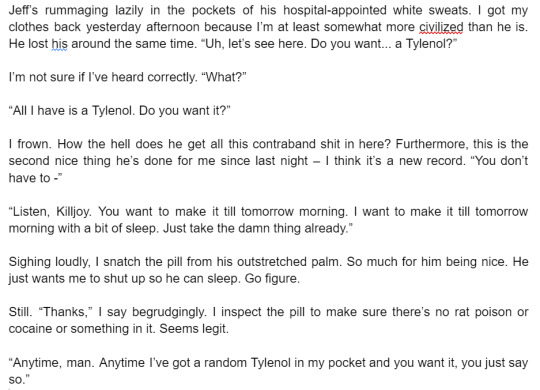
4 notes
·
View notes
Text
Adventure, 02, pragmatism, and humanism (morality of fighting, conflict resolution, the importance of personal choice, etc.)

Adventure and 02 are naturally very idealistic series, but despite being idealistic, there are times when they can get rather pragmatic -- even uncomfortably pragmatic in ways that seem a bit unusual for a kids’ show. The entire last quarter of Adventure and almost all of 02 dealt so heavily with the topic of “is it okay to fight, even if it means incurring deaths?" to the point it’s pretty hard to miss, but both series have an approach towards the morality of fighting, the possibility of potentially having to kill enemies (including former friends that have turned antagonistic), the approach to dispute resolution, and the meanings of “moving forward positively” and “not getting hung up on needless negativity” that are surprisingly nuanced. At times, there’s even a strong message that warns against getting hung up on preachy principles that sound noble on their face but actually don’t get anywhere in practice.
This is a handful of topics, and it’s to the point where it may seem a bit strange to condense all of these under one meta instead of dedicating separate posts to it, but I decided to on the grounds of the fact that they’re all very tied to each other in the course of Adventure’s narrative. Overall, both series are very kind to the feelings and mentalities and thoughts of the young children involved, having the characters not only be kind towards each other but also encouraging the audience to understand their feelings. This is an approach towards understanding oneself and others that happens to be very applicable to life in general, even for adults; both series float a balance of being pragmatic and yet humanistic, kind to the struggles and internal thoughts of all of the characters within, and have a surprisingly nuanced look at what it means to take part in conflict and what the “best thing to do” in such a case is.
As said above, this is a long and complicated meta, and it’s to the point where I’ve considered separating it into multiple parts or posts, but in the end could never bring myself to because of how interrelated all of these topics keep ending up with each other. So, to spare those of you who are intimidated by the sheer length and winding-topic nature of this, here are the main points:
One who is not emotionally ready to fight, or is unwilling to fight, should not be forced to fight. On top of it being inhumane, emotional exhaustion is treated much in a way similar to physical exhaustion; especially in a world where fighting strength is linked to emotional will, one whose heart is not in it will not even be able to effectively fight in the first place. Even when joining the fight is the obvious ideal solution, one who needs to sit out should not be blamed or scorned for it. A choice to fight is exactly that, a choice, not an obligation; the world is messy and imperfect, and the most you can do is try to do whatever you can within the best of your ability. If you do, there is no reason you should be scorned for it.
There are many meaningful ways to contribute to the overall fight that don’t necessarily involve direct physical violence; those ways are still valuable and necessary, and those more attuned to those roles should embrace those roles if it makes them more comfortable to do it that way.
If an extreme result -- such as killing the enemy -- is reached, it needs to be done with the first and foremost priority being to protect people and prevent casualties. A diligent effort should still be made to preserve as many lives as possible (which means this isn’t something where you get to go all “knight templar” and beeline for a violent solution) -- but sometimes, there will be times when push comes to shove and that most extreme solution will have to be reached, even if that “enemy” was originally a friend, because inaction will very obviously lead to more people being hurt.
When a dispute about important points like the above is reached, everyone’s feelings must be acknowledged. This is not to be confused with philandering around with a “both sides have a point!” compromise; in fact, Adventure and 02 both make very firm stances on the above issues. Rather, it makes it clear that said points need to be made while not invalidating the other person for having those feelings -- that is to say, there’s a huge difference between “your opinion is wrong” and “you are stupid and unreasonable for having that wrong opinion.” Dispute resolution and understandings can only be reached when you properly understand why the other person came to that conclusion, and treat them with proper empathy and compassion while you try to work it out. You don’t have to acknowledge their point, but you have to acknowledge their feelings. (For those of you who have seen Appmon: Shinkai Haru is a master at this technique, and there are multiple times during the series where he will very assertively make his case against others while still appealing to the other person’s feelings and never denying their right to have them. This is also an extremely useful technique for dispute resolution in general, and I recommend that those reading this consider employing it more often, at least assuming you’re dealing with someone who’s open to listening.) Likewise, to truly reach out to someone and support them also requires understanding their feelings -- you can’t truly “support” them unless you’re capable of doing so.
There is a certain limitation in which adhering too closely to “moral principles” ends up becoming impractical, and don’t end up contributing to anything in the long run -- fixating over things like grudges, revenge, “punishing” people, and even the concept of forgiveness can quickly turn into platitudes. The best way to move forward is to not fixate on those principles or get hung up on the past, and rather think “now that we’re at this point at the current moment, what’s the best way to move forward in a way that helps others the most and minimizes harm?”
Adventure and the morality of fighting, and the necessity of personal choice
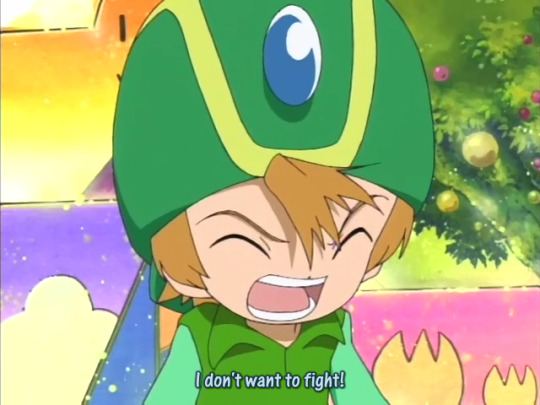
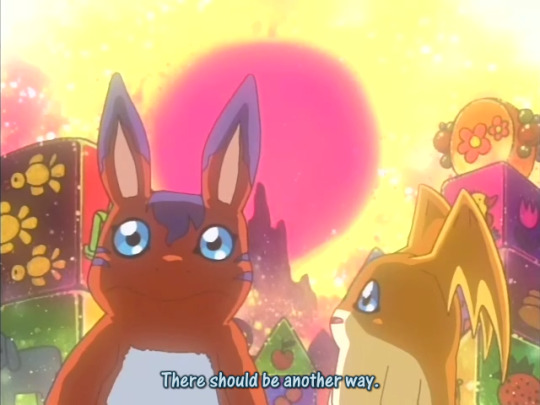

Believe it or not, the question of how feasible pacifiism is was first brought up as early as Adventure episode 12, when Takeru states that he has no intention of fighting Devimon. Elecmon calls this mindset out for the naivete of thinking they can just waltz up to Devimon and ask for answers instead of him trying to murder them on the spot -- and, in fact, he is completely right, because Devimon is not someone who can be reasoned with and indeed immediately tries to murder everyone on the spot one episode later, which results in Angemon’s death and Takeru trading out this very idealistic, naive mindset for the no-compromise, strict anti-darkness stance he takes in 02.
So there are two things to get out of this. The first is that, while Adventure and 02 are certainly very idealistic series, they are absolutely not naive. There are bad actors out there like Devimon who can’t be reasoned with whatsoever. Already off the bat, we have a clear statement from Adventure that an “everyone should stop fighting and get along!” mindset, when applied ad absurdum, is not going to get anyone very far.
The second is that none of the Adventure (or 02) kids like fighting. Takeru’s reaction here is certainly as extreme as it is because the idea of “fighting” presumably triggers his trauma from his parents’ divorce and the resulting split, but there’s no actual indication that any of these kids are necessarily fond of it. Certain ones like Taichi might get a little cocky midway through the battle when they’ve gotten it in the bag and are on an adrenaline high, but there’s also no indication that they’re interested in beating stuff up for the sake of it. Note that all of the fighting in Adventure episodes 1-10 was done out of sheer self-defense, and no Digimon was killed in any of the resulting battles (we’ll assume that the giant Bakemon in episode 11 doesn’t count mainly because it’s already dead) -- it was always fighting to the minimal amount to chase the attacking Digimon away or get them off their back. And, in File Island, that was possible -- but starting from the Server Continent and after, the hostile Digimon were actively out to kill them instead of just being territorial wild Digimon, forcing the Chosen Children to up the ante in order to survive.


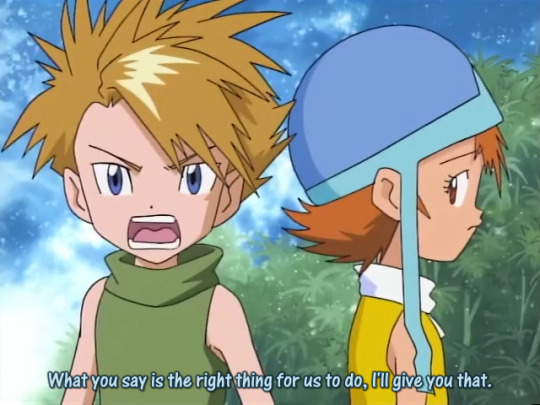

The issue of “whether fighting in itself is the right thing to do” is brought back in the Dark Masters arc, and this is also where we start getting a discussion about the disparity between “the right thing to do” and “whether one is capable of doing said right thing to do”. Mimi, the most emotionally sensitive of the group, starts having an emotional breakdown over whether they should keep fighting and potentially drag in more casualties -- especially because the Digimon that had died had all done it for their sake in order to continue the fight, and therefore the Chosen Children are indirectly responsible for their deaths. Yamato thus explains the difficulty of the situation: he himself agrees that Taichi’s evaluation of the need to push forward and continue the fight is the right thing to do, but it’s inhumane to not consider the stress and and emotional toll this is causing and force everyone to continue in spite of that.
In addition, Taichi’s reasoning for why they should continue is “revenge” -- a very negative, spiteful reason very tied to “fighting for the sake of it”. It’s understandable for Taichi to have these feelings, but he’s going at it from the wrong direction, and he’s overall being very insensitive in this scene. Later, in Adventure episode 45, he says that he’s doing it for the sake of honoring the Digimon who died for them. In other words, a lot of the reason Taichi’s methodology isn’t working is that he’s hung up on “the principle of things”, and not the more pragmatic reasons one should fight.
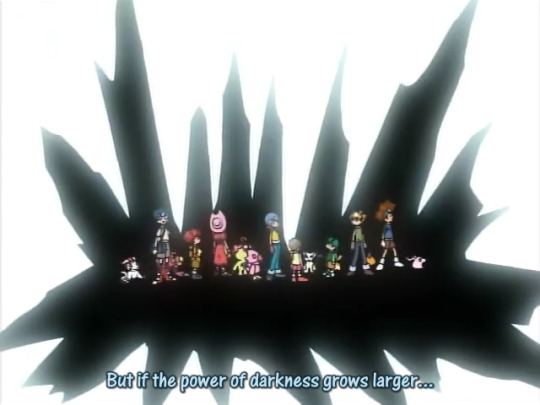
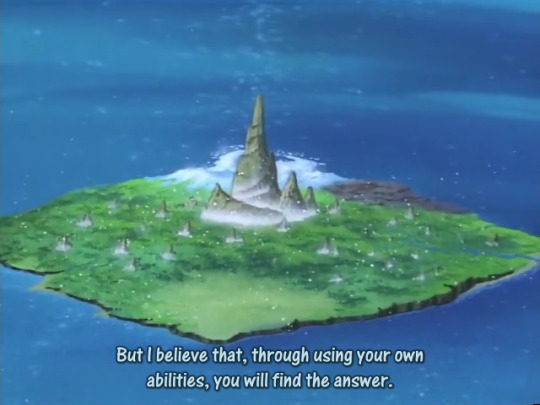
In Adventure episode 45, the kids finally meet the entity who chose them in the first place, who self-identifies as “the one who wishes for stability” -- the novels name them “Homeostasis”. Note the name -- it refers to the maintenance of internal balance within a living system, and Homeostasis themself starts their long infodump with their motive: it’s not that they want to eliminate all darkness from the world entirely, but that the powers of evil are upsetting the balance so badly that everything will be consumed if something isn’t done. It’s not like they’re insistent on violence either -- it’s just that they have a world to protect. The novels give us a particular amount of extra information on this entity, namely that it is not an omnipotent god by any shake of the imagination (in fact, there’s even an implication that there are higher powers that they themself don’t understand), and rather just a mere security system that observed that things were going south and used its rather limited methods of communication (via the Agents) to help make preparations.
Regardless, back to the episode -- we learn that the reason this entity recruited human children into all of this was because of the Hikarigaoka incident in 1995, which displayed to them and the Agents that a bond between children and Digimon could allow Digimon to evolve spontaneously, something that’s not possible with Digimon in the Digital World alone. Oh, and also, that they’ve been wanting to talk to them since File Island, and this entire thing about being cryptic with information was because they literally had no body and there was a massive amount of information loss after the Dark Masters blew up the Agents’ base and killed everyone except Gennai. In other words, just like with all of the actions the Chosen Children had been taking up until this point, everything Homeostasis and the Agents did was out of desperation because they were running out of other options to save their world, and during their brief time of being able to speak with the children, Homeostasis dumps pretty much everything they need to know and speaks to them using the extremely deferential sonkeigo form, meaning that they consider everything the kids are doing to be a massive favor to them. (Contrary to common belief, their possession of Hikari’s body does not seem to be non-consensual, given that they spend multiple episodes trying to contact her, and are clearly depicted having a proper conversation with her before temporarily borrowing her body.)
Most importantly, at the end of their speech, Taichi asks them what to do next, and the response is effectively: “We don’t know, but we trust you to make the best decision.” So, again: fighting as a Chosen Child is not an obligation, but something done because they want to do it and can. They were handed the tools to get this done by Homeostasis and the Agents, who believed in their potential to create miracles and be virtuous people and do something to save their world beyond what the native Digimon could do alone out of desperation and a lack of other options, and they are not hovering over the Chosen Children to see if they’ve “succeeded” or “failed” (note that they seem to have no sense of grudge or disappointment over Taichi’s SkullGreymon stunt in Adventure episode 16, explaining it very neutrally as an example of a risk), but more “we believe you were the best people who were able to do it and we trust your ability to help us.” (This is especially because, while it’s made clear they’d been wanting to contact them for a while, their most direct intervention comes right after Yamato had questioned why they were chosen in the first place -- presumably, they felt that the kids deserved an answer.)

At the end of Adventure episode 45, Mimi, considering the fighting they’re doing to be responsible for all of the fallouts and the sacrifices, decides that she won’t participate anymore, and Jou decides to stay with her in order to convince her to come back (although the novel also reveals that he himself is having doubts, too). Very importantly: nobody begrudges Mimi for being emotionally overwhelmed and sitting out, and nobody even begrudges Jou for choosing to stay with her. This is smack in the middle of the Dark Masters arc when everyone needs all the support they can get -- but after everything that had just happened, it’s inhumane to force either of them forward in this condition.
Despite his doubts, however, Jou himself is already coming to understand the limits of “pacifism” at a time like this:
What he wanted to tell her was this: that he didn’t see any likelihood of co-existing with the Dark Masters, and that they had no other choice but to fight them. Even a neutral country like Switzerland had a military. They would be invaded by enemy countries without one. It would be nice and ideal if they used the nonviolent resistance approach as Ghandi did. But that didn’t mean it was okay to just be killed without lifting a finger… But not even he could find a good answer.
Again: Adventure and 02 are an idealistic series, but they are not naive. It would be nice if the fighting could all stop and everyone would be happy, but there are malicious bad actors who will take advantage of you sitting there and doing nothing.

And so, Leomon dies in Adventure episode 47, and Mimi and Jou learn the hard way: if they do nothing, people will still die. Mimi had witnessed all of the Digimon sacrificing themselves for the Chosen Children’s sake, and thus had followed the logic that their friends would stop dying for them if they stopped fighting, but now that they’ve stopped fighting, said malicious forces (in this case, MetalEtemon) went ahead and killed their friends anyway -- and they’ve gone and destroyed the Village of Beginnings to boot, preventing any of them from being reborn. So in other words, if the intent is to “prevent casualties”, as it turns out, inaction didn’t actually prevent casualties.

Nevertheless, Mimi does not like fighting. In fact, Jou doesn’t like fighting either. Both of them now understand that it’s the best thing to do in this situation, but is it really the best thing to do to force them into embracing violence because of this? Instead, Jou determines in Adventure episode 50 that the overall fight doesn’t necessarily mean that everyone has to jump in and get violent -- the likeable and friendly Mimi has started to cultivate a skill in getting other people to rally behind her, and Jou is starting to consider that he may have a future in treating the wounded and supporting people before they become casualties. Those are still valuable ways they can contribute without forcing them into doing things they can’t bring themselves to do -- and, indeed, Mimi’s rallied army ends up saving everyone’s rears in Adventure episode 52.


While Taichi is not there to personally witness this discussion, Adventure episode 50 has him make a slightly less reckless tactical plan, and he explains (directly citing what happened with Yamato, Mimi, and Jou as his rationale) that he’s learned that he needs to take into account the potential for there being collateral damage. Recall that, earlier, his motive for doing things had been on a sheer principle level, with a lot of negative emotions of spite and revenge. But now, he’s come to understand that the most important thing he needs to do is to “prevent sacrifices”, and that’s the reason they still need to fight. Hence, why Taichi makes a proper plan for doing it instead of just doing the first and most aggressive thing that comes to mind, since he’s a soccer captain and has the potential for being a bird’s eye tactician, after all -- this time, he just needs to channel it in a way that prioritizes the lives of people around them.
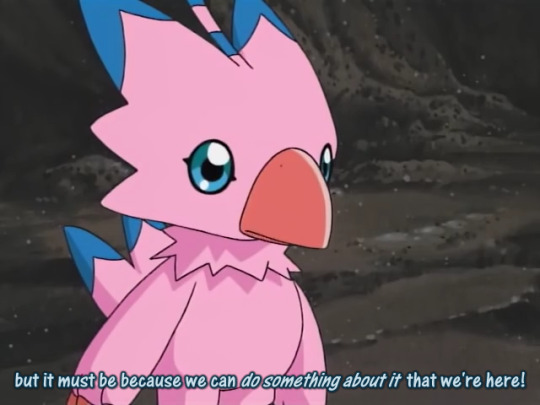
And in Adventure episode 51, when reaching out to Sora (who’s cracking under all of her self-imposed expectations and sense of duty to others), Yamato and Jou take what they learned from Homeostasis six episodes prior and apply it -- Sora is working under the mentality that they have an “obligation” to get this done and that they are impending “failures” if they don’t (and, to be fair, if they don’t make it, the world is going to end, which is pretty unambiguously terrible). But what Yamato and Jou do is reframe it to fall more closely under the philosophy of what Adventure is saying here -- the fact they can do something about it is already absolutely incredible. (I mean, not to sugarcoat the fact that the world is still going to end if they pull it off, but the stress, self-hatred, and self-blame of “we’re failures for not pulling it off” is definitely not going to help.) They are doing everything they can right now, within their reasonable abilities. If they end up not being able to do it, that’s not something that should be considered a sin or a failure on their part; they are here because they can and want to and are doing it and are here to make the best possible use of that.
It’s one of the many times Adventure and 02 will make this statement, indirectly or directly: despite the title of “Chosen Child”, the Chosen Children do everything they do because of their own choices, and because they want to, not because they have to.

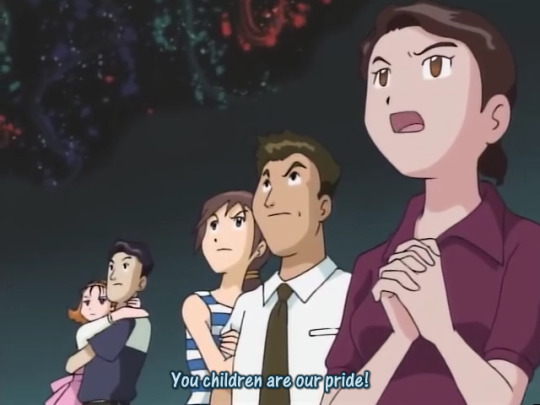
We finally meet Apocalymon in Adventure episode 53, and we learn that he(?)’s a combined spirit made up of all of the Digimon that were “eliminated” and failed during the evolution process, and is deciding to take out its anger and spite at the world out on everyone else by “denying evolution” (this is clarified in the novel to also be the reason it subtly influenced the prior enemies to destroy everything and especially the Village of Beginnings, because it functionally would put an end to the Digital World’s evolution by reducing it to nothing). So, in the end, we have a contrast between Apocalymon, who’s fighting for the sake of self-centered spite (including wanting to take down everything with it in Adventure episode 54 even when its demise is already clear), and the Chosen Children, who are fighting to protect their loved ones.

Incidentally, we also learn in Adventure episode 53 that there were Chosen Children who put an incomplete seal on Apocalymon prior to the ones in 1999. (Kizuna also introduces Menoa Bellucci, who became a Chosen Child in 1997, and assuming you’re following Adventure’s background doubling-every-year lore, at the time of 1999, there were a whole eight other Chosen Children besides Taichi’s group in existence.) The novels make it clear that the time dilation and distortion was going all the way up until the defeat of Apocalymon, long enough that the partners of those older Chosen were able to evolve to the Holy Beasts (and possibly enough for said older Chosen to get really faded through Digital World history to the point even Gennai doesn’t know about them). So the point here is that in the grand scope of the entirety of Digital World history, Taichi and his friends are not particularly singular existences -- there are people who saved the world before them, and 02 will introduce people all over the world who are going on their own adventures (including the main 02 kids in Tokyo), and, of course, by the time of the 02 epilogue, everyone’s going to have a Digimon partner. Koushirou later observes in Two-and-a-Half Break that there’s nothing special about having a partner in itself.
Does that make Taichi and his friends’ adventure of self-growth and saving a whole two worlds somehow insignificant, just because it’s not particularly unique? No. Because, again, they did this all not because of whether Homeostasis chose them or not, but because all of it was operated by their own will and strength and desire to protect others, all within the restraints of what they could feasibly do and handle, and they are amazing people for pulling that off.
02 and the importance of mutual understanding (and, also, more about the morality of fighting)

Before we proceed onto the 02 analysis, I think it’s important to establish a bit of important context about how 02′s lead protagonist, Daisuke, approaches things, and how it relates to the recurring debates on the morality of fighting throughout the series. In 02 episode 14, we learn that Daisuke was captured at Big Sight during the Odaiba Fog incident, and therefore witnessed, firsthand, the threat of Vamdemon’s lackeys attacking innocent civilians (something that Miyako, who witnessed the self-contained Omegamon vs. Diablomon battle on the Internet, and Iori, who only happened to be on a grounded plane after the Vamdemon fight had already ended, did not quite have anything on the par of). Spring 2003 and the Adventure novels elucidate what was going on in his head at the time: he was frustrated at his inability to protect his loved ones, and wished to have the power to fight the “bad guys” who were threatening everyone.
Remember this for later.
Moving onto 02 itself. 02 is a series about relationships, but, more significantly, it’s a series about the sheer amount of work it takes to maintain relationships, and especially the principle that “maintaining a relationship to another person requires being properly aware and understanding of the other person’s feelings.” One thing that often frustrates me about a lot of media (both kids’ shows and non-kids’ shows) and, well, to be honest, a lot of people in general, is the preaching of supposedly “positive” platitudes that actually go straight into what’s called “toxic positivity” for good reason -- because while it’s ostensibly “positive”, it also denies other people’s feelings, waving away everything negative and going “yeah, well, positivity!” and “optimism!” and “power of friendship!” and all sorts of stuff that are actually dismissive because they’re not showing any real effort to properly understand the other party and acknowledge why they feel this way. Like, sure, you may be telling someone to cheer up, but it also carries an (accidental or otherwise) implication of “you’re irrational and stupid for being upset and you should be smiling all of the time because ~positivity~.”
There is a lot of conflict in 02 -- especially because the theme of the morality of fighting is even more relevant, particularly in the case of the added question of “when the enemy in question is not an unambiguously evil sadist but a former friend in trouble”, and later the question of how someone who’s done horrible things in the past but is clearly making an active effort to make up for it should be treated. Daisuke, 02′s lead protagonist and carrier of a lot of its main themes, is ostensibly a simple-minded idealist, but even his theory of “positivity” and “always moving forward” has a lot of nuance beyond what you would usually see in this kind of anime lingo.



Context is also very important here. Adventure and 02′s stance being about “doing the best you reasonably can in a given situation”, it also means that what might be the best thing to do will change depending on context. 02′s starting circumstances are very different from Adventure’s, because it starts off without the threat necessarily being immediately world-threatening -- certainly, they need to stop the Kaiser, but this is in the form of a long-term territory war with an enemy who (at the time) doesn’t appear at night, and it’s unclear just how long it’ll take. This means that when the threat is not immediately world-ending, none of the kids are ever given grief for prioritizing their own personal obligations in lieu of fighting.
Iori and Jou do choose to ditch their kendo lesson and prep school exam (respectively), but they make it clear that they did this out of personal choice, and in fact this conversation opens with Armadimon apologizing to Iori for giving him grief for not coming, because he thinks Iori is perfectly within his rights to have stuck with the lesson! Perhaps, if the world were to end in a few hours, it would certainly be pretty idiotic to insist on sticking with a kendo lesson or prep school, because those things aren’t going to exist anymore if the world ends, but this is a very long and drawn-out territory war with no known end, and it’s understandable that these kids need to maintain their life necessities while straddling the balance between the war and their lives as a whole.
Again, they’re doing the best they can, and being a Chosen Child is about doing things because they want to, not because they have to.

This is especially because the Kaiser himself attempts to exploit the meaning of a Chosen Child in 02 episode 3 -- again, being a “Chosen Child” means being trusted to do the right thing with what you’re given, but the Kaiser basically betrayed that trust, and nobody was able to stop him from exploiting it and attempting a takeover with it. And Ken takes that title of “Chosen Child” and interprets it to mean he’s entitled to all of this -- but the other kids are Chosen Children just like him, and (at this point) all of them are simply choosing to do whatever they want with that.


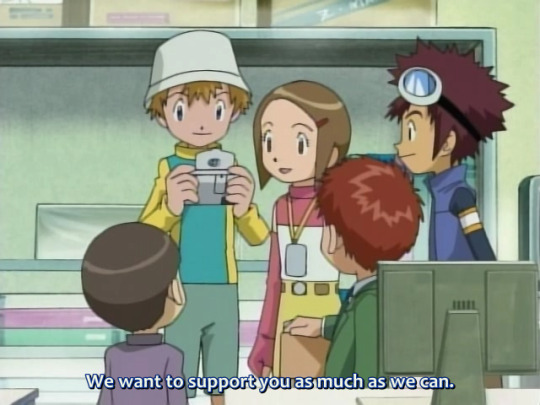
And on the flip side, you have the Adventure seniors, who are a little nerfed by the Dark Towers, but as far as the way the younger 02 kids see them goes, there is no doubt that the 02 kids respect them deeply and are practically reliant on their support and advice, and their experience and maturity in comparison to themselves. The episode that establishes most how in awe the 02 kids are of their seniors is 02 episode 17, where they learn the details of the adventure in 1999, and so it’s not about how much combat power they’re displaying right now but rather how much experience they have in doing such amazing things. Likewise, their seniors are frustrated at their inability to help -- not because they see it as some obligated duty, but because they see their juniors trying their best to deal with an ongoing crisis and want to help, resulting in them providing support roles such as covering for them with a camp trip in 02 episode 18 and allowing them to do a long-term Digital World stakeout. For this, the younger 02 kids adore them and give them all of their respect.
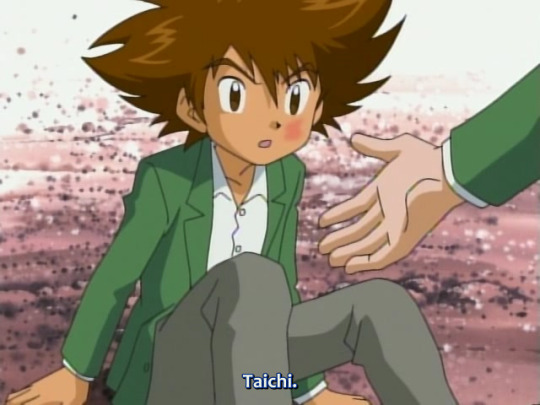

02 episodes 10-11 are significant in juxtaposing the themes of “conflict” and “understanding each other’s feelings” -- at the end of 02 episode 10, we see Yamato punch Taichi, but he holds his hand to him right after, indicating that Yamato punched him not out of anger or condescension or scorn over Taichi’s hesitation to fight Agumon, but rather simply to snap him out of it for his own sake, knowing he wouldn’t take it offensively, so in other words, what looked like a “conflict” on its face was actually communication between the two, with neither of them treating each other with scorn.
The conflict at the end of the episode is over whether they should run the risk of killing Agumon in the process of fighting him to get him back from the Kaiser’s Evil Spiral-induced brainwashing (note that this is about the risk, since it’s not necessarily guaranteed they’ll have to kill him, and they still of course need to make a conscientious effort to prevent that outcome). Yamato, however, frames it in terms of very practical matters, and even takes Agumon’s own feelings into it while he’s at it: if they pull back purely for the sake of not running that risk, Agumon will end up being the Kaiser’s slave and killing machine and nothing will be resolved, whereas if they run the risk, the best outcome is that Agumon is saved (which is, fortunately, what happens!), and the worst outcome is that he’s killed, which is still a preferable outcome to him having to remain the Kaiser’s brainwashed slave used to kill other things en masse.
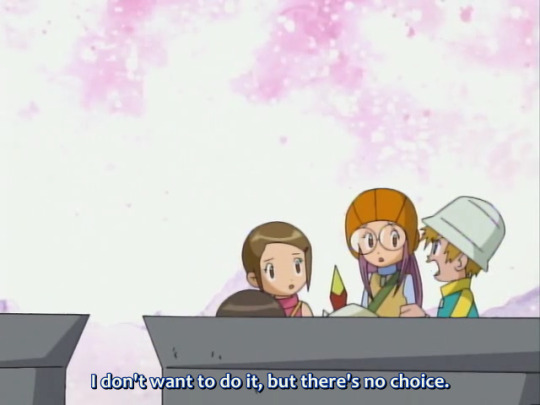
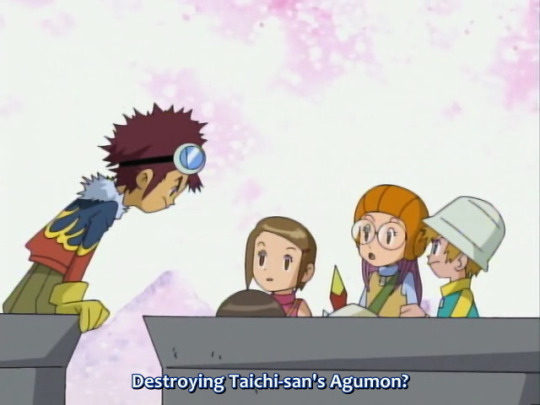

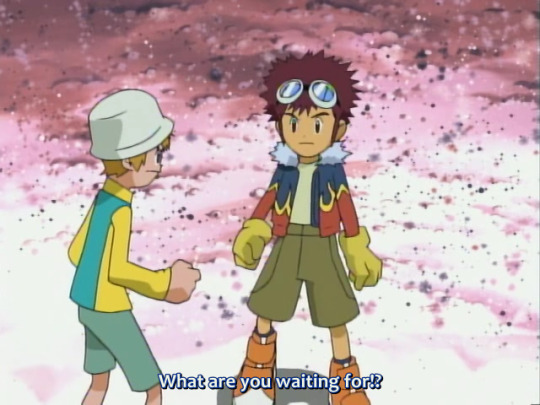
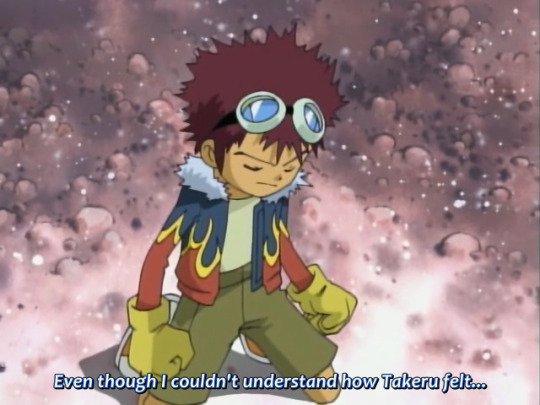
02 episode 11 further explores the theme of conflict in the face of “understanding each other’s feelings”, as it starts off with a fight between Daisuke and Takeru on the grounds of whether it’s okay to risk killing Agumon. Takeru’s stance is to side with Taichi’s decision, even if he doesn’t like it (again: just because some of these kids are able to make these decisions doesn’t mean they like it, and they’re doing it not because they’re callous but because they’ve thought hard about it and have decided it’s the best option they have!). Daisuke, being a bleeding heart, is appalled that Takeru could so easily endorse killing Taichi’s partner, and the two fight.
Note that the series does not “both-sides” this issue -- Taichi and Takeru’s stance is basically treated as the optimal course of action here -- but it also doesn’t invalidate Daisuke’s feelings of understandably being very shocked and appalled by this! Taichi and Yamato, in what initially seems like a violation of common sense, encourage them to be allowed to continue fighting, saying that it was essential to their friendship, and that confuses everyone present at the time -- but the meaning becomes clear by the end of the episode, when Takeru’s own Patamon is momentarily taken by the Kaiser and put at risk of himself becoming an Evil Spiral slave. Takeru blows up at Daisuke for hesitating (remember, this is one of his triggers), and eventually runs the exact same risk he’d advocated for Agumon with his own partner.
Remember what I said about “toxic positivity”? If everyone had just forced Takeru and Daisuke to shut up for the sake of “not fighting”, both of them might have remained angry at each other and stewing in silence, but because of the conflict, Daisuke himself personally witnessed Takeru run that risk for his own partner, presumably for the same reason (as much as the potential of Patamon being killed hurts him, the idea of Patamon being used as a killing machine is even more panic-inducing for him). With that, he understands that Taichi and Takeru made the decision to go ahead with this not out of callousness or cruelty, but because they sincerely felt they had to, no matter how much it pained them. Daisuke rails on himself for not understanding Takeru’s feelings better, and considering that he and Takeru never get in this vicious of a fight again, the point is: it wasn’t about whether they should form a friendship by fighting or not fighting in itself, it was about the fact that the two of them were able to get their feelings on the table, and that Daisuke was able to understand why Takeru endorsed what he did. (And this, too, is what it means for why Taichi and Yamato are friends now because they fought so much in the past -- back in Adventure, those fights ended up having them bare some very raw feelings to each other.)

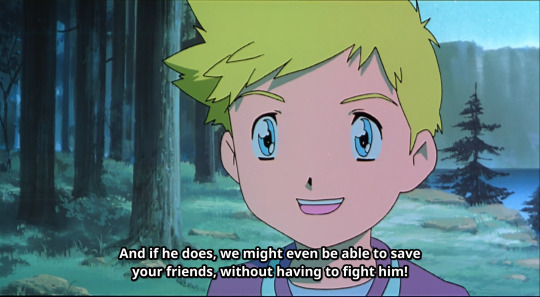
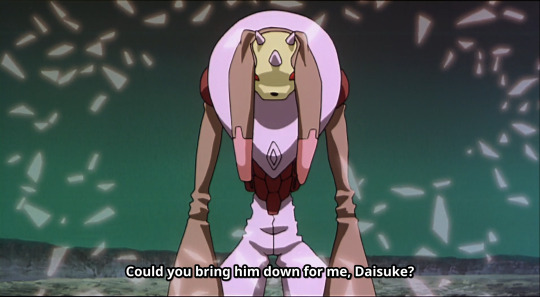

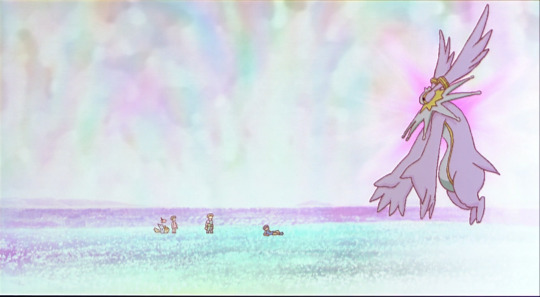
While in the series itself, they’re successfully able to save Agumon anyway, Hurricane Touchdown presents a more unfortunate outcome of the “friendly fire” debate, in which Daisuke learns that the hostile Digimon kidnapping their seniors (and, later, a lot of other people) is Wallace’s own partner. Daisuke is so emotionally overwhelmed by this that he breaks down crying at the possibility of having to kill someone’s partner, knowing that he’d never be able to do something like this if it were V-mon, and Wallace gets him on board with an attempt to appeal to Chocomon without fighting.
This stance is not unreasonable, Wallace and Daisuke cannot be blamed for being hopeful, and, in the end, it’s admirable that they did make a conscientious effort to solve this with pacifism (again, this kind of attempt should be made, and it’s not good to beeline to the most violent solution for no reason). But unfortunately, once they meet Chocomon in the flower field, it turns out that not only is Chocomon beyond reason, he himself is also clearly out of his right mind and suffering through all of this, and Wallace finally relents and asks Daisuke to assist him in the fight (after having stayed in denial for half a movie about wanting to avoid this). Daisuke, witnessing all of this himself, agrees without hesitation, and eventually, it turns out that this decision for the best when Chocomon himself begs Gumimon and Magnamon to put him out of his misery, and them obliging (albeit hesitantly) allows him to have peace in death instead of suffering in life.
Hurricane Touchdown’s sequel drama CD, The Door to Summer, presents Daisuke with yet another dilemma with Nat-chan, who is also clearly suffering in quite a similar vein (the parallel is directly drawn). In the end, the same conclusion is reached -- Nat-chan is unfortunately killed, but is able to find release.
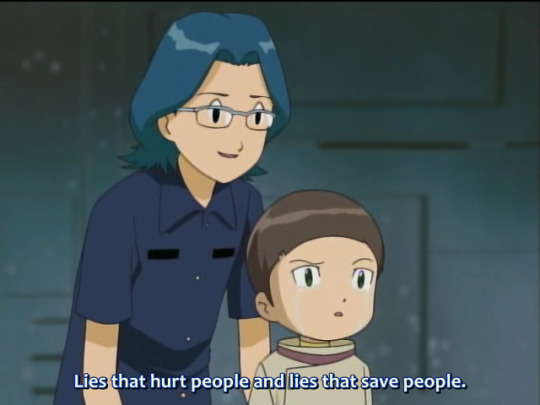
02 episode 16 presents an argument about the limits of ethical principles instead of approaching things practically, when Iori considers himself a horrible person for having told a lie to get Jou out of an important exam. This is mainly just about a lie, but in terms of Iori’s character arc and its relevance to 02′s themes as a whole, the point here is that there is a certain point where being too stuck on “the moral principle” of things instead of thinking practically is actually selfish in some sense. If Iori hadn’t lied, he’d get maybe one more point of moral integrity, and then everyone would have suffocated to death -- compared to lying and therefore everyone for the most part benefiting (Jou’s very happy to help his juniors and save them from, well, literally suffocating, after all). This topic becomes very important later when it turns out to be generally applicable to the wider morality of fighting that the kids later face in the series’s final cour.

The disparity between “moral principles” and “what actually happens in practice” also shows up in 02 episode 19, when Takeru loses his composure and starts punching out the Kaiser. Is the Kaiser a horrible person (at this point) who totally deserves this? Absolutely! Are we as the audience getting a lot of catharsis seeing his face punched out? Probably! But at the same time, railing at the Kaiser with unbridled anger is also...not actually accomplishing anything! Instead, Takeru’s just getting a few moments to stew in some really unhealthy emotions and uselessly punching out the Kaiser while nothing productive is getting done, and it’s also contributing heavily to his emotional isolation from Iori (and the rest of the group) because he’s not coping with it in a healthy way at all. Takeru’s feelings are certainly understandable (again: the episode is absolutely framing this in such a way that you’re inclined to take his side), but at the same time, being malicious about this is not actually practically making any headway.
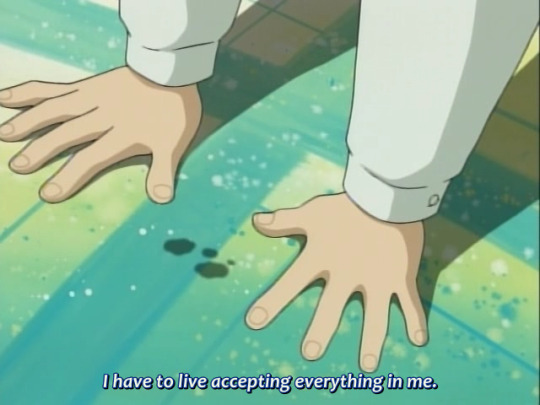
One of the major reasons I’m covering all of these seemingly unrelated topics in one post is that all of them end up having a massive combined amount of relevance to the narrative behind Ken discarding the Kaiser persona, and how he comes to integrate himself with the group. On the surface, the storyline seems to be simply that Ken learned the error of his ways and tried to stop drowning in regrets, and Daisuke’s idealistic personality reached out to him and helped him heal. That said, there’s quite a bit more going on than just that.
A theme going on behind Ken’s character arc for the second half of 02 is one that probably seems a bit unusual for an idealistic kids’ show, but the point that ends up being made quite often is that whether Ken should be “forgiven” for his actions is a rather immaterial question. 02 episode 23 has a bunch of Baby Digimon rail on him, and remind him that he will never be able to take that back. There is nothing in either world that will erase those actions or make them retroactively justified or pushed under the bridge. The only thing he can do is accept the fact that it happened, whether he likes it or not, and determine what to do from here in terms of taking responsibility and making things right.
And this ends up having an influence in how Daisuke advocates for him, and how the rest of the group reaches out to him...
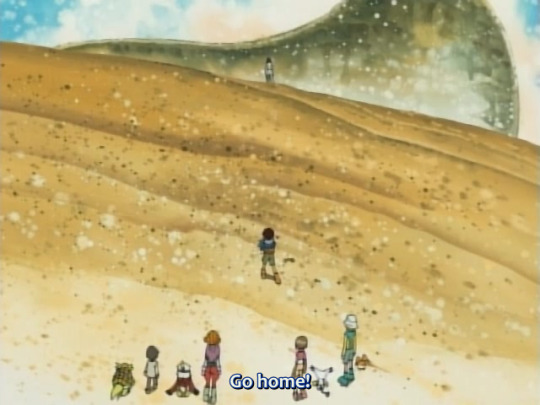
First of all, Daisuke being the most open-minded about Ken was not blind optimism. There’s no evidence that he was actually all that emotionally receptive to Ken or interested in being his friend before 02 episode 25. However, Daisuke also does not advocate for “punishing” Ken or kicking him while he’s down -- because that won’t accomplish anything, and Ken is clearly not in a state to be wreaking more havoc right now. Daisuke remembers the footage of Ken’s parents crying on screen, and determines what would be the first course of action to fix this situation -- and thus, he tells Ken to “go home”, because whatever Ken did in the past and no matter how much the team resents him right now, they are in this situation, with a boy who’s clearly not going to cause any more trouble right now and a family that’s hurting by his absence, and the very least he can do is do something productive from here on out.
Hence, at the end of 02 episode 24, when it turns out that Ken’s back and saved them from Thunderballmon, Daisuke decides to be optimistic about him and start the process of emotionally reaching out, but, again, it’s not blind optimism -- he sees what Ken did and takes this to mean “okay, clearly he’s not going to do bad things anymore, so regardless of whatever he did in the past, he’s helping out now, so we should check in with how he’s doing and let him help out.”
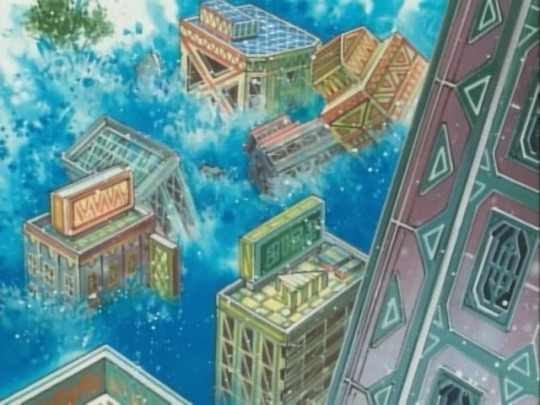

This is, of course, enhanced by the fact that Daisuke had communicated with the Crest of Kindness in 02 episode 20, but there’s also another layer to this: the major point of dispute between him and Miyako in 02 episode 25 (with both of them generally being rather open-minded about Ken otherwise) is in regards to the fact Ken and Stingmon were responsible for killing Thunderballmon in the prior episode. Come the climax of 02 episode 25, it is made clear that if Golemon successfully destroys the dam, the results will be absolutely disastrous, and there will probably be an incredible amount of casualties. Here, Daisuke himself is the first person to realize that killing Golemon may become a requirement (Ken is not actually a part of his initial comment) -- that is to say, most likely, the reason he’s willing to give Ken the benefit of the doubt about Thunderballmon is that he himself is understanding of that potential mindset (especially since 02 episode 43 does indeed establish Daisuke as being the first to accept it).
Recall that, between Daisuke, Miyako, and Iori, Daisuke was personally involved three years prior in a large incident with an unambiguously malicious Digimon that was about to claim a ton of victims -- he’s a bleeding heart, sure, but he’s also a bleeding heart for the potential victims, and the one thing that ate at him during the time of the Vamdemon incident was that he couldn’t do anything to protect everyone. Therefore, he’s the most receptive to this potential conclusion because he doesn’t want to see victims like that again. Not only that, Takeru and Hikari (having witnessed similar conclusions back in Adventure) are also very quick to point out that this might be an inevitability -- it’s just Miyako (who, in her emotional passion, is desperate to find a way out and clinging onto the hope that they won’t have to) and Iori (who considers doing such an act “no better than him” -- again, see the fixation on “moral principle” and “being above him”) who are so vehemently against it.
In the end, it turns out that Golemon is a Dark Tower Digimon (and therefore not sentient), and everyone’s left off the hook for now, but the reason this is still important is that through this, Miyako learns that Ken -- someone whom everyone was side-eyeing for potentially lapsing back into his cold, callous ways after supposedly having given up the Kaiser mantle -- was not out to kill (and, indeed, when the first kill inevitably happens in 02 episode 43, Ken is just as shaken about it as Miyako and Iori). The important part is that Miyako, and later the other kids, accepted Ken not out of some principle of optimism or forgiveness, but because they came to understand his position and feelings. All of the kids accepted Ken on their own terms after understanding his feelings and position better via interacting with him and hearing his own testimony -- they came to understand his mindset, what he’s been through and what he’s planning to do from here on out, and, most importantly, that he needs support really, really badly right now.
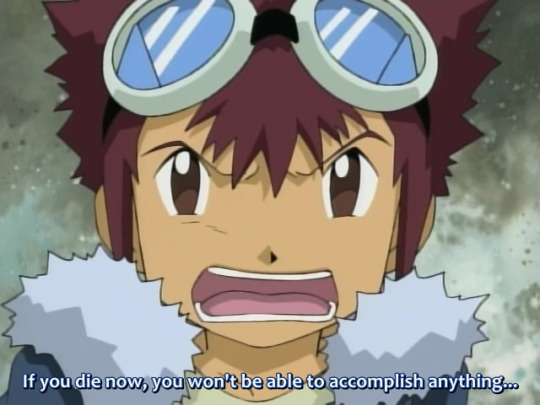

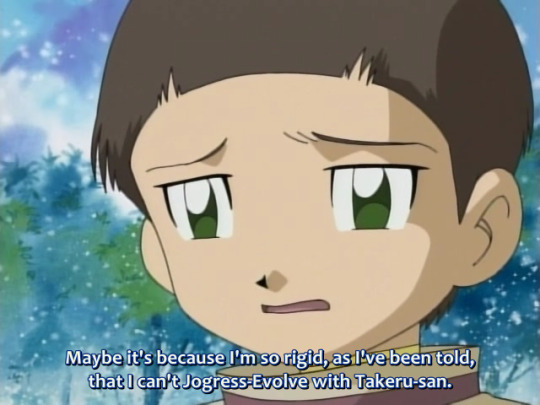
Which extends not just to Ken, but also everyone’s relationships here in general. Daisuke broke through to Ken and kicked off their first Jogress in 02 episode 26 because he proactively listened to everything Ken was saying and what he wanted to do, and correctly identified that Ken very desperately wants to take responsibility, so he talks him out of a reckless suicide mission by pointing out that all of his attempts to not make his family sad and to make up for everything he’s done are going to amount to nothing if he just throws his life away like this. In 02 episode 31, Miyako listens to Hikari’s troubles and her compulsion to not speak out for herself and reaches out to her successfully via promising to be there for her so she doesn’t have to slink into passive resignation. And in 02 episodes 34-36, Iori makes an active effort to understand Takeru’s mentality and why he has the drastic personality shifts he does, and communicates to Takeru that he wants to understand him better. So the point is: the 02 kids were able to successfully connect with each other and become deeper friends because they made an active attempt to listen to each other’s troubles and address the core of what they needed. They were only able to become “supportive” once they understood everything.
(02 episode 36 also has a moment where Iori’s about to rail off at everyone for not taking the fight seriously, before Armadimon reminds him that he’s starving -- again, it is very inhumane to ignore other needs and force everyone to keep fighting endlessly just because they theoretically can.)

We do meet the representative who claims credit for choosing Daisuke, Miyako, and Iori as Chosen Children in 02 episode 37 (Qinglongmon, representative of the Holy Beasts), and he explains the process of why they sent the kids what they did in order to retrieve Ken from the deep end. Notably, Qinglongmon admits that even the Holy Beasts were blindsided by a few things and adapted the situation as they saw fit (they didn’t originally expect the kids to be able to use multiple Digimentals at first). More importantly, this was, again, all a bit of a desperation move, because this was about as much as the Holy Beasts could manage, being sealed and drained of power and all.
Also, while retrieving Ken from the deep end was on the list of things the Holy Beasts set out to do, “everyone becoming Ken’s friend” was not necessarily on that agenda. Again: that was something that these kids chose to do on their own, by observing Ken’s actions and feelings and choosing to connect with him.
The episode ends with BlackWarGreymon going off on a journey of angst, and: note that the kids decide to drop the issue for the time being. Again, they’re operating not on a philosophy of grudge or whether one should get retribution for their actions, but what the likelihood of bad things continuing to happen is from here on out, and at this point in time, it doesn’t seem very likely, so there’s no point in pushing the issue or pursuing him.


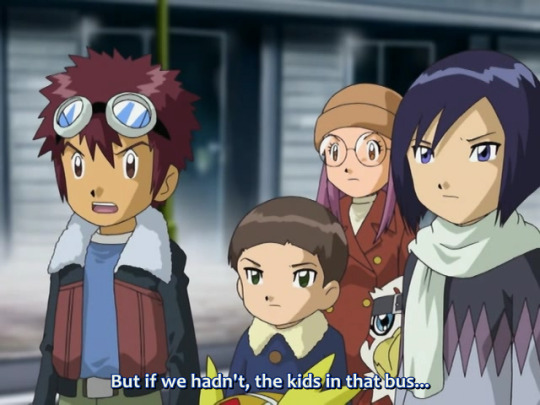
Nevertheless, the morality debate over killing still remains looming over everyone’s heads, with Iori also realizing in 02 episode 29 that there are such things as Digimon that just want wanton destruction and cannot be negotiated with. The fact that the Adventure kids were put in world-threatening situations three years prior and are already far past this question is directly acknowledged in 02 episode 43, with Taichi advising Hikari that this harsh truth is going to hit the other four sooner or later, before it does eventually happen at the end of the episode. (Hikari visibly winces during her conversation with Taichi; again, none of the Adventure kids ever liked this.) And, in the end, predictably, Iori, Miyako, and Ken take it hard -- but Daisuke is the first to point out what would have happened if they didn’t do it. Namely, that the victims would have far outnumbered the Digimon they just killed.
It is, of course, good to be conscientious and not beeline for the most violent solution, and, again, context is important here -- in the situation provided, SkullSatamon was holding up a bus and split seconds away from murdering everyone in it. Had everyone refrained for the sake of morality, just like how Iori refraining from lying back in 02 episode 16 would have actually been selfish in a sense, here, the only claim you get to say after refraining is “well, I wasn’t the one who caused the harm.” Inaction would have caused the deaths of all of the young children in the bus; there would have been casualties either way.
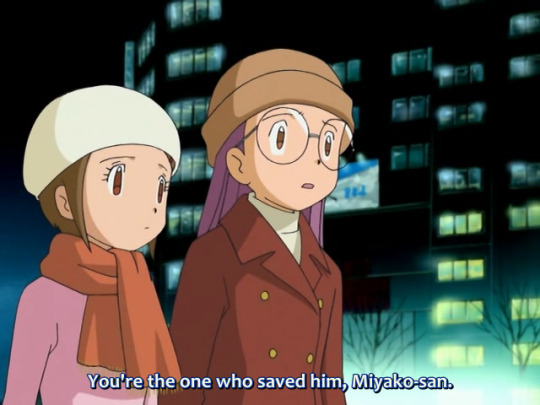

Miyako and Iori are forced to face this truth again in 02 episode 44, with both of them being emotionally compromised by the reality of what they just did. In both cases, Hikari and Takeru step in to remind them what they’re doing this for, by pointing out the victims that would have been killed had they done nothing. Miyako and Iori are not at fault for being emotionally compromised or doing their best to prevent it -- it’s just that there’s only so much they can blame themselves for when they’re now directly faced with the potential victims in front of them.
Iori had already been grappling with this potential for several episodes now, so while he still takes it hard, more attention is given to Miyako’s reaction -- especially since she herself was the victim who was about to be murdered by LadyDevimon had Silphymon not done the kill. The voice acting and lack of Tailmon’s presence in Silphymon’s apology to Miyako implies very heavily that it was the Aquilamon side who took over and did it in a last-ditch effort to save Miyako’s life -- and he’s emotionally destroyed by it himself too, because he did it out of love for Miyako, and yet betrayed her request to not go for the kill. In the end, Miyako is forced to confront the fact that this was done out of love and a desire to protect, not a callous and malicious intent to murder, and comes to terms with it.
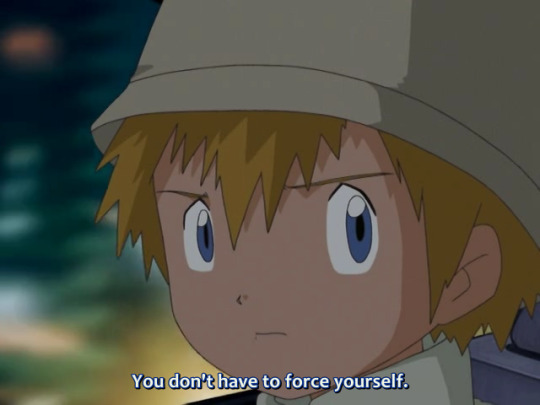
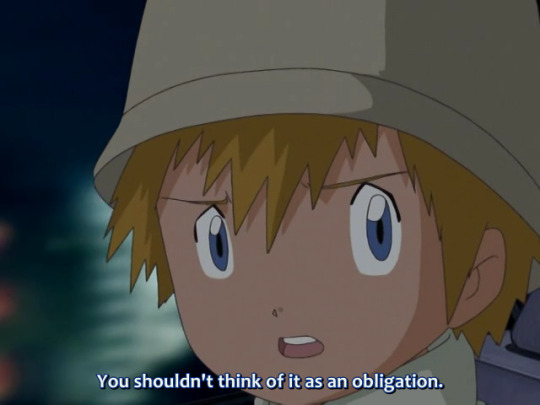

However, again: the series continues to reiterate that people who are not emotionally up for it should not be obligated to force themselves to do it. The beginning of 02 episode 45 has Takeru directly advise Iori that he shouldn’t do this out of obligation if he isn’t up for it -- remember that Takeru will only be able to fight with Shakkoumon if Iori is present, meaning that he’s perfectly willing to give up his ability to fight effectively because it’s not fair to force Iori to do it. This is not a series that advertises that everyone embrace the spirit of killing things and numb themselves to it. This entire situation sucks.
However, Iori makes it clear: he understands everything, and has decided to do it himself, because he understands the stakes and what it’s going to take to actually protect people.
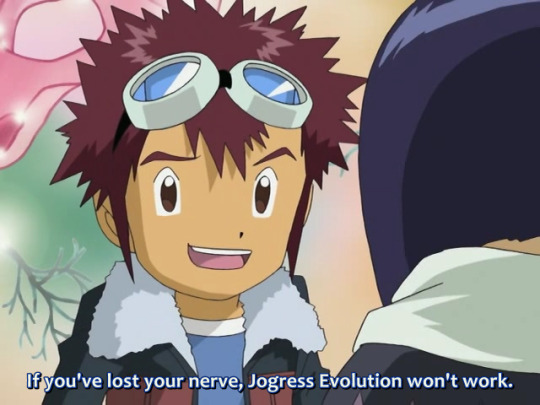
Which is also reiterated in 02 episode 48 -- after witnessing the deaths of Archnemon and Mummymon at the hands of BelialVamdemon, everyone is shaken to the core. It should be established that the kids didn’t have much reason to sympathize with or like the two of them at this point, because everything we learned about them was from the audience’s point of view -- as far as the kids knew them, they were just two really rude and cruel Digimon who wanted wanton destruction. Yet even they are emotionally pained to see them die in such a cruel manner, and it causes everyone to hesitate -- even Daisuke, who does push forward because he knows what’s at stake, but still has to take a moment to collect himself.
Seeing what Daisuke’s about to do, Ken tries to force himself to join Daisuke so that Daisuke will at least not be alone (note that he actually says upfront that he’ll join!) -- but Daisuke notices that Ken’s heart isn’t in it, and actively advises him to sit out. Is the world in immediate crisis? Absolutely! But there is no scorn to be had for people who are emotionally falling apart right now and unable to get themselves to do it -- Daisuke even says himself that they won’t be able to fight effectively with Ken like this.
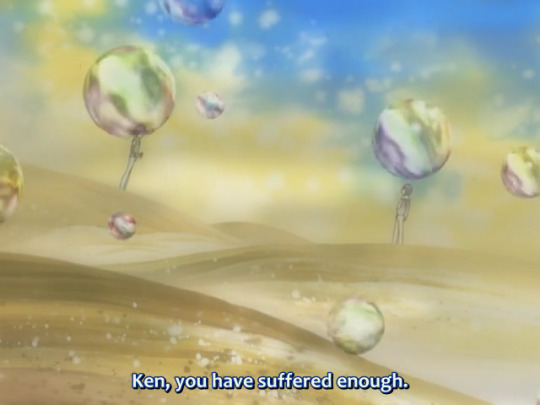

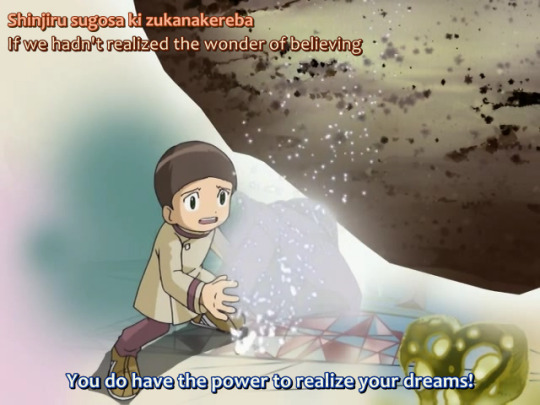
We close this analysis on a return to the concept of forgiveness and moving forward, and we learn in 02 episode 48 that Ken has two parts to his internal wishes: he wants the Kaiser (himself) to be “punished”, and he wants “forgiveness” from his deceased brother Osamu. Both of those things will certainly make him feel a little better emotionally, but they also won’t accomplish anything -- the “Kaiser” doesn’t exist anymore, so what good will that “punishment” do besides a little catharsis for the victims? And he can continue chasing after this standard of “whether he’s suffered enough” like it’s some numerical tally, but that’s not going to get him anywhere either, and it’s why Wormmon has to chase out even that ostensibly happy image of Osamu. Osamu is long gone, and is not going to return, and the question of whether Ken should be “forgiven” is rather immaterial. It’s not about whatever happened or didn’t happen back then; it’s about what Ken is going to do now.
Actually, what is “forgiveness” anyway? At no point do the 02 kids ever actually say they “forgive” Ken for his actions. In Spring 2003, Iori also says he doesn’t forgive Oikawa for what he’s done, either. There’s nothing that will ever erase what they did or suddenly make those actions retroactively justifiable, and there’s no arbitrary payment that Ken or Oikawa could do to meet some kind of quota of forgiveness. But what the kids do recognize in Ken is that, regardless of whatever he did in the past, at current he is a young boy in intense emotional distress who has gone through a lot, is working very hard to make up for his mistakes, and needs all the emotional support he can get, and there’s no reason to hold a grudge against someone like that instead of continuing to support him and loving him for who he is now. Given that, does it matter whether they “forgive” him or not?
And even if Iori will never forgive Oikawa, he can still lament everything that happened to him and drove him to do everything, and appreciate the meaning of what he did for the Digital World in the end, and use this as a further lesson on what it means to understand people instead of stewing angrily in a grudge that’ll only hurt himself.
Ultimately, that is the theory behind Adventure and 02. The world is messy, imperfect, and doesn’t fit under neat rules of morality and “right” or “not right” that you can cram everything under. Despite that, there’s something to be appreciated in not throwing in the towel and continuing to do the best you reasonably can in every situation. It would be ideal if all of the fighting could stop, or if it were possible to make the “optimal” decision of fighting or not fighting in every situation regardless of human exhaustion or emotional compromise, but that’s just not something that’s possible, and there’s no reason to call oneself a “failure” for not holding yourself to that standard. And in the end, the answer is this: instead of fixating on all of those arbitrary things that don’t actually serve any practical purpose, the way to live your best life is simply to look at where you are now, think about what you can do from here on out (regardless of what happened in the past), and do your best to protect and be kind to yourself and those around you.
Of course, you must be kind to others. But you have to be kind to others by understanding what it takes and everything around it -- and then choose to be kind anyway.
121 notes
·
View notes
Text
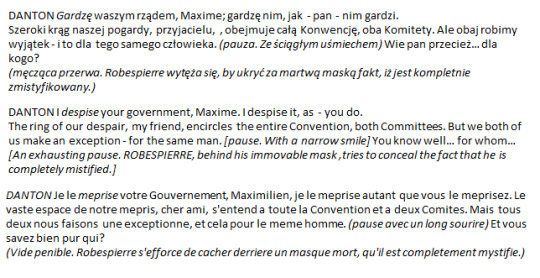
I cannot claim to know about this play more than some others (Ewa Graczyk, Jagoda Hernik-Spalińska, Kazimiera Ingdahl and Maria Janion, in alphabetical order, are the official Horsewomen of the Apocalypse in this topic), with a lot to bring to the table, and so I will sometimes discuss parts of it which are - at the very least at the first glance - absolutely and doubtlessly simple; but by discussing them I hope to be able to bring into the discussion some new material, new evidence, perhaps - for the contrary of the popular belief.
I remember when I first read the scene between Danton and Robespierre, I was completely mystified, just as Maxime. To somebody who at that point knew nothing about the historical events, the exchange between them was very logical (and everyone knows how hard it is to obtain, especially in a piece of media where the author blatantly favours one of the characters over another). I am very glad then, to be able to say that while Przybyszewska did everything she could to humiliate and belittle Danton in the more visual aspects of the scene - his gestures, movements, actions, mimicry, even the sound of his voice etc. - she didn't bother making him out to be a complete clown. His arguments are populistic, but that's not necessarily a bad thing when you're n politician aspiring to be even more than that. Perhaps she thought that painting him out to be a weakling would somehow diminish Robespierre's awesomeness, which is a valid concern. For Robepsierre has little left to do in this scene - it is made out to ba a confrontation between them, of sorts, but is it one, really? I don't think so, not for the large part of it. Robespierre comes in, dishes out few sarcastic lines, looks at Danton with disgust and contempt and then crushes him in a yet another sarcastic line and then leaves. There isn't that much he can do not only to participate in the exchange, but to be visually and audially appealing to the audience as a character in a play. And even though we all know staging The Danton Case is a secondary affair, the main thing you can do with it is to read it and ponder over it, when you do stage it, a lot of responsibility rests on the actors recreating the part. Which is why choosing a good actor can, potentially, make all the difference, sometimes going as far as completely changing the way you view the very same scene you read earlier.
I have always assumed by "the same man" they meant Robespierre. It makes some sense in the light of the conversation, altough I have to admit it makes little sense in the light of Robespierre's reaction. The question thus presented to us is: do we go by what is written, do we percieve a play as a piece of fiction in a real world, OR do we immerse ourselves in the fictional world, suspend our disbelief and for a moment treat it as an alternate reality of sorts?
Polish director Jan Klata has managed to put on stage a compelling retelling of The Danton Case and I would like to present to you a scene from his version, which we're lucky enough to have on YT, with translation courtesy of @that-one-revolutionary. I've seen the play in its entirety: some metaphors were heavy-handed to say the least, some aspects I wish he'd done differently, but all in all, when choosing the main protagonist, the director casted in the role a truly splendid actor (please note that Marcin Czarnik was young. Young! It made all of the difference and it's worth watching if only for that), who brought home some of the points of character of Robespierre's which could have easily been brushed aside in order to highlight some other aspects of the conversation (the most famous example of this would be the very same scene from Wajda's movie, where the appealing and in all aspects imposing Gerard Depardieu dominantes the scene, thus presentign it in a very different ligt). While it can be read as a political statement, or a match of two great personalities, or a display of cunning on either part, Klata (or Czarnik; it's hard for me to say what the director tried to do with it, a lot of Robespierre's quirks, mimicry, gestures etc. seemed to come directly from the actor, which I can only say because I've seen him in other things and that's sort of his style of acting; all in all, I'll try to treat this not as a discussion over this particular staging, because for that I lack needed data, but it's unavoidable in the long run at least at some points, so please bear that in mind) treats the conversation itself as a minor thing in comparision to what is going on in Maxime's mind at the moment. Just look at this: there is no significance brought into their meeting, no change of the scenery, nothing indicates this meeting is special in any way. The logical conclusion is, then: it's not special. Both Danton and Robespierre seem to treat this as a step which cannot be avoided, but which bears no great weight either. The only reason they agreed to make this step altogether is - for "the same man". For Camille.
I do think Przybyszewska's intention was actually to disguise Maxime under this vague title. If this is a play about love - as I will always state it is - she wanted to underline the fact some people will be hatefully loved by those who are beneath them, who have nothing whatsoever in common with the object of their affection simply because the loved one is so great, so genius, so shining and bright it is impossible not to love them. I think this is the relationship between Danton and Robespierre (that is, on Danton's part) up until this point in the play. Danton idolizes Robespierre against his will (against both of their wills, really), because Robespierre is truly made out to be a demi-god at the very least. If you could team up with a hero like this, you should. So Danton goes through a humiliating process of trying to reconcile with Maxime, because humiliation, if everything paid off in the end, would be worth it. That Robespierre doesn't reciprocate the affection is simply a further proof that he is above Danton in every way.
Klata-Czarnik duo seems to have gone into another, subtler direction though. The man that both politicians make an exception for seems to be Camille, moreso because Robespierre loves him than because Danton has any special feelings for him. What is his relationship with Camille, anyway? They are cordial enough, but always a bit on the edge, and we know that Danton doesn't know everything that Camille thinks and feels in regards to Robespierre, mostly because he doesn't care that much, but also because he is characterised as a brute, and this simply goes above his head, it's too subtle, too delicate of a feeling for him to know it. It is also clear he knows Camille pretty well, but he doesn't know his soul, so to say. Therefore, he cannot actually love him, not to the point to make him the one and only excpetion from his otherwise coldly and precisley calculated plans.
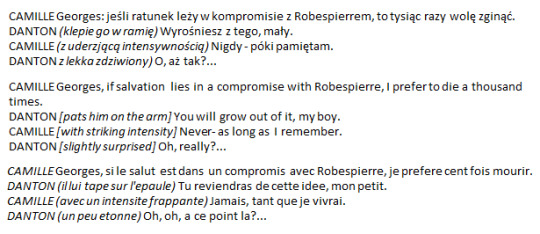
Is there, however, a scenario in which Camille could be Danton's exception? Yes, when it becomes more about Robepierre than about Camille. When Camille is sort of offered as a mean to lure Robepierre in. Danton could make this exception only if it meant getting what he wanted (which is later mirrored by his blatant admission that the only reason he lets Camille take the fall with him is to deny Robespierre any joy in life after this point).
Robespierre, however, doesn't see it this way. He actually makes the exception for Camille and I think Danton's words – whatever he means by them, whichever interpretation we think is correct – put him on alert, for the fear of having his secret discovered. In the video linked above it is even more than that – once Robespierre hears Danton indirectly name "the same man", he gets aggressively defensive. For him to have someone like Danton talk almost openly about what he treats as his personal secret (a secret that Danton, being in great familiarity with Camille, could potentially know for certain) is equal with defiling it. I have violated your secret. Do you know what he says in the original? I have raped your secret. It really brings into the focus how much “the secret” needs to be protected, and how much it will hurt Maxime once it’s uncovered and destroyed.This is what he fears pretty much for the entirety of the conversation, his suspiscion somewhat confirmed when Danton says: No catchphrases, Robespierre. I know you.
As I mentioned earlier, the shift in my reading of the scene was prompted by the video. It is worth observing what exactly does Robespierre do when mentioing Camille by surname – he gets visibly more upset, he ponders for a split second for the best way to talk about him. His choice of words is interesting as well:

Both translations here are poor and I quite like what that-one-revolutionary did with it. "Katarynka" is a music-box, so "an instrument" fits much better (not to mention the obvious English connection to the phrase "play like a fiddle", which is adequate here). A parrots is after all a living being, something with a will of its own, if steered by more powerful handlers. But admitting that Camille, from his own free will decided to go against Maxime and everything that Maxime believes in is much harder for Robespierre than calling him an inanimate object, which can be unwittingly used by people with their own agenda. That leaves Camille almost blameless, perhaps careless and foolish, but not responsible fo anything that has transpired.Calling him names serves another purpose as well, which is to steer away the suspiscion that Robespierre protects Camille becuase he cares about him in a special way. He knows there are Danton's accomplices turning ears by the door, so he doesn't want to give himself away with his care and concern.
Ultimately, what do you believe, whom do you think they were referring to I think says a lot about what you think about Maxime's state of mind at the time. Danton's too, though, it can be used as a litmus test whater or not you believe he was honest in idolising Robespierre and offering him his adoration and obedience. In some stagings it will be presented as true, in some as a lie, and that's the beauty of adapting a piece of literature, there are so many options, all blooming from the same roots.
#sprawa dantona#the danton case#L'Affaire Danton#stanisława przybyszewska#stanislawa przybyszewska#maximilien robespierre#maksymilian robespierre#kamil desmoulins#camille desmoulins#georges danton#jerzy danton
14 notes
·
View notes
Note
I can't believe I didn't think the todo/endev stuff would've been divisive. Like if you don't like it then that's it, you just personally don't want to see it, that's valid, but then you have some ppl calling ppl who do like it and even hori abuse apologists (despite some of them being survivors themselves) but THen you have ppl on the other side insulting those who can't stomach it and, why is this all a thing.
CW/ abuse mention
I'm not all that surprised it stirs up such intense reactions. Unlike saving the world or becoming a hero, the struggle of a household and each of its members healing from a horribly abusive past, complete with all its uncomfortable, different, ugly blistering wounds and scars is way too close to home for a lot of people. Even for those who may have never experienced the same "severity" (in quotes because comparing trauma to silence or talk over victims of any kind is not okay - different forms of abuse is still abuse that leaves lasting impacts and effects everyone differently) they can feel personally connected to that pain.
I'm not surprised whatsoever that Endeavor is such a controversial figure. I would argue that's a good thing. If we come to love his character after lots of growth it's because he's really changed in the ways he's needed to and continuing on that road. If we can't ever get past what he did it's still justified because he's legitimately left the lives of his entire household in shambles - a home full of people who his chief responsibility was to love, provide for, and protect - who will carry the scars (some literal) of what he's done for the rest of their lives.
What surprised me most, however, is how Dabi became to be such a chief spokesperson for the entire family despite being the most removed as far as attitudes towards Endeavor and his actions in response; and how he became the only "valid" victim for so many.
I absolutely pity what he went through. He was absolutely right to feel abandoned. He was abused as much as anyone in that household. His trauma was just as real, just as impactful, and just as valid as the rest. All of his childhood trauma was a result of his father's actions of which Endeavor does need to face and account for. Even his desire to lash out at the objects of his father's affection - his mother and siblings - as a child as a way in his mind to make the pain stop and regain what he legitimately needed in his father's attention and affection is understandable given the circumstances. He's very much damaged, and the onset of that damage is not his fault. He desperately needed help he never got.
But here's where the split happens: at a point he was removed from his family and their influence and became his own person at which point he decided to step on the gas and purposely cause collateral damage on top of the self-destruction.
To be clear, simply leaving that harmful environment and growing up does not erase the damage it caused. PTSD would not be a thing of that was the case. However, Dabi is in one of two states given his behavior: he's genuinely insane (mentally ill to point he doesn't recognize what he's doing - a justified legal defense of insanity) or he's at least lucid enough to know and purposely chose to inflict harm on others because of whatever benefit he feels he gets from it (not able to plead insanity).
Either way, he's a clear danger to himself and others and needs to be reigned in. If he's not in full control of his faculties he needs professional help and has to be taken into custody for everyone's safety. If he is all there, it's right for him to be prosecuted to the fullest extent of the law because trauma does not excuse making more victims of any kind.
And for some reason, despite these facts well being able to coexist, the fandom doesn't seem to accept that - at least not uniformly and the disparity of opinion is night and day. We have real life examples of people who went through traumatic childhoods who became serial killers, and we don't disagree that they needed to be institutionalized or prosecuted for the safety of the public and their survivors; but Dabi gets a pass somehow?
Perhaps the main divide comes down to some can't/don't/won't make a distinction between Touya the abuse victim and Dabi the abuser. Both can and do exist in the same person, but the focus of his life's goal has shifted to be distinct enough to make that distinction as the audience. As a child, he was a victim who was doing everything he could think to do to get what he needed in a horrible situation. As an adult with ample degree of rational thought and self-awareness, he leverages his damage to justify the homicide he commits against his own victims.
And this especially is why I have pity for Touya, but not for Dabi.
I knew someone who did that - who did that to me. Someone who I considered a friend, even "family" until I set boundaries and started acting contrary to what they wanted when it was like a switch went off inside them. They had a legitimately terrible upbringing and a questionable family situation, at best; but that didn't mean I had to suffer the effects those negative influences splashed into my life.
If something I did made them upset and what they only ever knew was to verbally express, "You're lucky I have the control to hit the wall instead of you when I get this upset" that anger is valid, but I was also right to say, "If this is a problem, I'll do what I can to make it right on my end, but you do not have the right to threaten me, emotionally manipulate me, or lash out in retaliation - and especially not without consequences or pushback. You need help, and I want to help you help yourself; but that was not acceptable. I am responsible for me and what I do, not for how you take things and respond."
It boils my blood thinking back how often they tried to peddle back and make me the bad guy in my own head by trying to guilt me with their own tragic backstory so I'd stay complicit. Clearly, I'm still not completely over it, and I was unpleasantly reminded of it not long ago when nightmares with their face came back to haunt me for the first time in years after just seeing their name again in passing earlier that day. It took a complete stranger I met at a house party telling me after I spilled my guts late into the night for me to even begin to recognize that I was being manipulated and abused.
So yeah, there it is yet again - the Todofam drama is way too close to home for too many people. The worst tragedy in that, though, is that no one can apparently be validated in their opinions unless they bare themselves like I did just now. That shouldn't be the case. These discussions should be able to exist as hypotheticals and discussing canon events instead of requiring everyone who wants to weigh in to have their own trauma validated.
It's easy to pile onto Endeavor because he's the clear "bad guy" in the scenario who will never be able to erase what he's done even if all of his family magically forgave him and he turned into the patron saint of puppies and kittens. But for some reason it's not easy to recognize people can feel the same way about Dabi who can recognize him for being both victim and victimizer.
I wish it wasn't the case. There's a lot of right and wrong and stuff that isn't wrong - just uncomfortable and sucky in this subplot; but fandom is too stuck on insisting in an all or nothing bad guy/good guy to fully appreciate the nuance in this plotline.
27 notes
·
View notes
Text
The Problem with the EDI Thing
It will surprise no one who’s familiar with me to know that I’ve sat on these opinions for what is, embarrassingly, close to a decade. I remember not having the vocabulary to explain how I felt at the time, and my opinion has done a little evolving since then, but seeing as I’m doing the whole Mass Effect thing right now, I may as well explain myself. I’m very much not a fan of the Joker/EDI pairing, and if you are, power to you. However, I have some feelings about that that come from who I am as a person as well as just surface level stuff such as not finding that romance particularly substantive, but there we are. I don’t have osteogenesis imperfecta, but I am a disabled person. Ain’t that fun to write. I’m not embarrassed about it, but I also don’t like talking about my stuff too much, since, like, it’s private? So forgive me for being a little vague. It’s relevant to the points I’m making, though, so bear with me I guess. So part of the reason I like Joker so much as a character is that he’s lived a life where people have just told him no, all the time, and yet he aggressively exists, even in spite of it. Wasn’t born into money, had a bunch of horrible problems, and didn’t ask for any of it. Everywhere he looked, some dickhead was at the door telling him to stop trying. However, he had his dream and his drive and his passion, so fuck what those people said. He went for it, he broke all the rules that people had put in the way of even letting him try. He knew that if he had a shot, he could do it. It was just about getting that shot. He knew his specialism could do the rest. Man, I relate. I can’t tell you how many times I’ve been forced to have to “prove myself” to fit into someone else’s definition of what a “good candidate” is. There have been so many instances where, because I don’t ‘fit in the box’ like everybody else, I’ve had to work twice as hard and still get overlooked anyway, even despite having the knowledge or the skills. It’s honestly bullshit, so seeing him in the position he’s in really means a lot to me. It’s a breath of fresh air to see someone with such obvious struggles still do what they love to do. So, being disabled, you get condescended to, quite a lot for one reason or another. People talk to you like you’re a child, or make weird assumptions about what your life experiences are, or start being a dickhead to you once they’re tired of how you struggle with your disability. It seems like people just kind of expect you to get over it at some point, especially so if the disabilities aren’t visible. “I guess I just thought you’d be better at this by now” starts to become a phrase you can just tattoo on yourself and have a person point to whenever they want to say it so it doesn’t waste any more of either of your time. It can make you cagey, defensive, emotionally withdrawn, and fucking tired. Not only do you have to deal with whatever it is physically or mentally or both, but now you’ve got your own insecurities and other people’s insecurities about you to deal with all the time, every day. Some people turn this acid manufactured through this daily experience into sarcasm and dry humour, a sometimes self-deprecating deflection tool you can deploy to make people smile and defuse the situation and not talk about anything important because good god let’s not go through that again.
You can sometimes get weird ideas about whether or not you deserve to be loved like everybody else. Because you’re different, and you function differently, you can sometimes feel like you are looking at the world from the outside, on the sideline. Because you have a disability that does indeed work to your detriment, whatever it is, because of its very nature as a fucking disability and not a superpower, getting caught up in that question of whether or not you deserve to be loved and the “I just thought you’d be better at this by now” exasperation from other people combines into this huge ugly thing. Now, I’m a big fan of sci-fi and transhumanist concepts and I love moral and ethical discussions about what constitutes a person and all that good stuff. I enjoy EDI as a character and as a concept. I especially enjoy EDI when she’s a sphere with a little Winamp visualiser for a mouth, because I feel like it creates a lot more of a dialogue around that specific idea and it’s fun to talk about. When she looks like an abstract object, how can she be a person? And yet, she both is and is not. So, I find it more than a little thematically weak that EDI gets this like, 1950s style fembot body that looks like she’s wearing garters. I mean, I’m bi, I like hot women too, but that aesthetic decision was very strange and I felt undermined the previous and interesting work done to explore EDI as a concept. EDI grows and evolves in several ways throughout the games, but is, at the end of the day a machine, and doesn’t experience love in the same way, if at all. She learns to approximate human behaviour and eventually learns to mimic and anticipate quite a lot, but she is what she is, and I don’t think there’s any taking away from that. From a purely writing based perspective, I found that path fairly tokenistic and poorly justified, in my view. It also always read to me as ‘d’aww, throw the guy a bone,’ ‘haha pat him on the head and give him a toy’ type thing rather than an actual real emotional exploration, which, given how the entire game series makes it very clear to us that Joker is a very important character, seemed... weird. So when you combine all of this, I’m so allergic to the Joker/EDI pairing because personally I find it condescending. I find it communicating to me that, no, I and others like me are in fact not worthy of a powerful and passionate romance with peers. What we are worth is a tokenistic, fetishistic and ultimately unrequited fling with a fleshlight. Like, that’s how it feels to me! I get that my experiences aren’t universal or whatever but I’ve had nearly ten real entire years to think about it, and I can’t interpret it any other way. I literally do not have any animosity whatsoever where it comes to Joker and any other pairup. It’s only Joker/EDI and it’s fucking frustrating that that’s the canon one. I’m sure I can make another equally long and boring post about the case for Joker/Shep and I’m sure I probably will do because it’s not like we’re leaving the house much these days. Inb4 y u take fictional character so srs y u talk about art
#mass effect shipping#mass effect joker#jeff moreau#jeff joker moreau#probably fandomwank I don't really understand the term though#disability experience#disability and games#shoker
55 notes
·
View notes
Photo
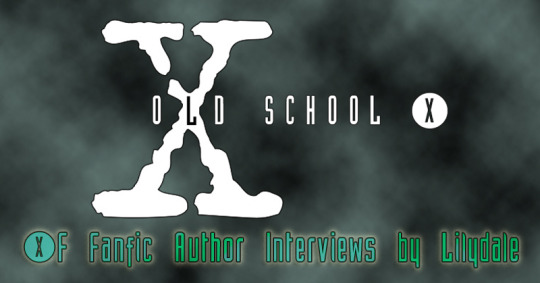
Old School X is a project interviewing X-Files fanfic authors who were posting fic during the original run of the show. New interviews are posted every Tuesday.
Interview with Mary Ruth Keller
Mary Ruth Keller has 42 stories at Gossamer, plus her stories are at AO3. She's written a number of short standalone stories, but she's thought through the X-Files mythology and written about it probably as much as anybody ever has. So if you want to dive into the mythology and all its drama, you need to go read her mythology fics ASAP. (But read this long, interesting interview first!) Big thanks to Mary Ruth for doing this interview.
Does it surprise you that people are still interested in reading your X-Files fanfics and others that were posted during the original run of the show (1993-2002)?
Quite frankly, yes. The Kuxan Sum Cycle branches off the actual series following the Third Season episode Syzygy. I took the myth-arc as it stood at that time, post Nisei-731, and the agents in mid-Rift. Although I didn’t quite realize it when I started out, I was most interested in moving the myth-arc forward in a continuously unfurling narrative, one where Scully and Mulder became an effective investigative team who support each other as partners and friends again. After I started writing in my little corner of the X-F universe in 1996, there was a lot of stuff on the show that just happened, with no real storytelling logic to it I could fathom, but that seemed to be popular. I stopped writing in 2000 because I was frantically busy at my new job (which consumed far too many twelve-plus-hour workdays and weekends) and because my sister and I were trying to take care of my elderly, increasingly frail, Mother. So, I never expected, when I started writing in 2018 and posting again in 2019 (I reposted all my stories, in order, to AO3 and fanfiction.net, because Chermera would never have made sense without them) for readers to take an interest in myth-arc and character issues that the series writers had simply abandoned to go chase, well, anything else, especially if it made no coherent sense whatsoever. What do you think of when you think about your X-Files fandom experience? What did you take away from it?
The fandom was a lot of fun. There were many interesting, engaging discussions I took part in with other fans of the show, some of whom I am still in touch with.
Social media didn't really exist during the show's original run. How were you most involved with the X-Files online (atxc, message board, email mailing list, etc.)?
All of the above. I spent a lot of time discussing writing and characters with other writers on ATXC, except when I was actively working on my novels. Since I was doing basic research into microwave remote sensing of the Earth while working at the Naval Research Laboratory at the time – yes, I was one of those dreaded Department of Defense scientists the show had a love/hate relationship with – my writing happened at night and on weekends. Novels, especially the longer ones, take me about a year from first words on disk until release, which meant I didn’t have all the time to participate on-line as I would have otherwise. But, I enjoyed chatting with the fellow denizens of the Endies Board, and on the EMXC, Scullyfic, and Je Souhaite mailing lists. I’ve saved some of those posts and conversation threads on my older computers, where it’s fun re-reading them from time to time. What did you take away from your experience with X-Files fic or with the fandom in general?
There were a lot of generous, funny, very intelligent fans involved with X-F back then (not that there aren’t now; there are, of course). I started writing because I wanted to get the myth-arc and the characters back on-track, the long-term story moving forward and the agents again being the smart investigators I loved hanging out with on Friday nights. But, outside of having read a lot of myth, literature, fiction, and non-fiction, I didn’t know enough about the mechanics of writing fiction. Several authors were willing to help out, some explicitly through E-mail conversations, and some from general comments about crafting stories that were posted to ATXC. I had a real problem with how I initially handled dialog, which I had some E-mail guidance on, that was very much appreciated. I also had two quite diligent beta readers, one an on-line fan, and one a real-life friend, both male, who helped me with the direction of the Scully-Mulder half of Anath. I was, at the time, utterly exasperated with how the pair of them had become such complete morons on the series, both totally incapable of investigating anything successfully, which was affecting my writing the characters in that story. What was it that got you hooked on the X-Files as a show? Ooh, boy. I’d like to say I started watching with the show with the Pilot, but I didn’t, quite. Tom Shales was the Washington Post TV critic at the time the Pilot aired – yes, not only was I a government scientist, I was living in Alexandria, Virginia, in 1992. He was intrigued by the characters and premise and found Duchovny and Anderson engaging while playing their roles. At the time, I was wrapped up trying to work on a PhD while still employed at NRL, so I tucked the review away, waiting until I had Friday nights free to check it out. I’m a great lover of science fiction, so I thought to give the show a try, eventually. [Lilydale note: I found a couple things Tom Shales wrote about The X-Files premiere in 1993: Fall 1993 TV preview article and a “Pilot” episode review.]
The first episode I sat down to watch was the First Season Darkness Falls, where Mulder and Scully get trapped at the logging camp with the Earth Firster, Doug Spinney, the logging executive, Steve Humphries, the Forest Ranger, Larry Moore, and the gooey green bugs. I was amazed by that story. It was as perfect a little piece of science fiction as I have seen on TV (except for one bit toward the end), with an environmental moral to it as well, where all the characters make good and bad choices, and they all suffer or succeed because of them.
What hooked me, really hooked me, were the first/second acts, specifically, Dana Scully’s actions, once they find the desiccated logger in the tree. The investigation is handled logically, in that it’s not the big male agent who goes shinnying up the trunk to look at the evidence while everyone else stands around watching and wailing, “Whatever shall we do!” No, it’s little Dana Scully who takes the ride to the upper branches. This made oodles of sense, in that she was this tiny woman whom two men could lever up that far with a rope, a hand winch, and pulleys. When she gets there, after grimacing (who wouldn’t, considering what she saw), she starts investigating. She does an on-the-spot post-mortem exam, while Mulder makes an ooky male-body-parts joke, but everyone takes her results seriously. I was thrilled. Here was a female character I could really relate to, someone who could hold her own in a difficult situation, unlike most of those on the tube, then or now.
I made a point, over the following summer, of watching as many re-runs as I could, catching up on the episodes and characters. The stories ran to science fiction and horror, which are my preference. Further, although there was an emphasis on the paranormal, several of the first season episodes were written so both Mulder’s wanting-to-believe-but-needing-proof intuitive, emotional approach and Scully’s logical, scientific, justice-oriented viewpoint each got the narrative coherently from initial crime to identifying and apprehending a suspect. It was some spectacular, complex writing, and I was hooked, hopelessly hooked. I discuss this some on my old author web-page, which still exists, courtesy of the Wayback machine), so I won’t belabor it. What got you involved with X-Files fan-fic? The shenanigans within the Third Season, quite honestly. The myth-arc wasn’t moving forward, as it had during the Second Season, which I really couldn’t understand. Carter had given us this bang-up start in the ABC Trilogy with all these new fictional possibilities to explore, but instead, bupkis. The MOTW’s were retreads with no depth or moral/ethical weight to them, except for Darin’s stories. The intelligent agents I had enjoyed spending time with while they pursued their oddball investigations were evaporating before my eyes. Mulder had always been this deeply intuitive character who cared about others and knew he could get it wrong, so needed Scully’s logic in their investigations, even if he didn’t always want to hear her observations and questions. But that character was being replaced by a cookie-cutter misunderstood anti-hero, who wasn’t thinking, just running off to chase butterflies, who was always right because he was The Guy. Scully, as an investigator, the little agent who could, was simply being sidelined. Sure, she’d argue with Mulder, but the writers had stopped giving her and her logical viewpoint a real role in their cases, Darin excepted, again. As the series went on, the Agent and Doctor Dana Scully I respected was replaced with this snappish little female whose only notable skill was running in high heels, who spent her time standing around with her arms crossed, and made pruney faces at Mulder if she were required to do any actual investigating. I hated that character, but, apparently, the all-male writing staff just loved her.
I knew about the on-line fandom, so I thought to check out if anybody else had noticed these “improvements.” First, I spent time at ATXF, discussing the changes with the series, that disturbed a lot of folks, not just me. Eventually, I tripped onto ATXC. There were writers there who understood the two characters, quite well, but weren’t that interested in the other problems with the show that bothered me deeply.
Like many fan-fiction writers, I decided to try to bring in, or in my case, bring back, what I was missing in what was being aired. Sins of the Fathers was the result. As I mentioned above, it was a far from perfect story, but I learned much putting it together, and it got a lot of positive feedback. So I kept writing and trying to improve what I wrote. Folks appreciated it, then and now, surprisingly, which was endless encouragement to keep going. What is your relationship like now to X-Files fandom? With work and my Mom, as I mentioned above, I dropped out for a few years. My new job is still microwave remote sensing of the Earth, at a University-affiliated laboratory, not working directly for the government, but the NASA/NSF-type funding for the research I like to do is much harder to come by, so it takes up a lot more of my time to keep funded and working. Adding to that, I haven’t found places like ATXC in the 90’s or the Endies Board, but I suppose lightning only strikes once. Were you involved with any fandoms after the X-Files? If so, what was it like compared to X-Files?
Not really, no. I’ve enjoyed other TV series, but, I never felt those shows were just throwing away essential parts of themselves as X-F did, or, if they went bad, I simply stopped watching them. A fandom is, or can be, a huge time commitment, which, as I’ve noted, I don’t have that much of. I discuss this quite extensively in my author’s notes at the end of Chermera, so I won’t repeat myself. [Lilydale note: the long author notes are at the end of the story’s last chapter, not in the AO3 notes section.] Who are some of your favorite fictional characters? Why?
As a child, I loved reading myths and legends from many different cultures. So many amazing stories, so much that touches on truth. Greek myth, Norse legends, Islamic tales, Celtic fables, all of them. It goes without saying that discovering Tolkien’s fully-realized Middle Earth in my early teens was like falling into an river of endless delights.
In literature, perhaps the character I enjoy most is Sherlock Holmes. On television/in movies, I’d have to say: Beverly Crusher, (early) Dana Scully, Susan Ivanova of Babylon 5, Pa’u Zotoh Zhaan and (early) Aeryn Sun on Farscape, Samantha Carter on Stargate SG-1, Hermione Granger, and most recently, Lagertha on Vikings. Dunno, there might be a pattern there. Possibly. Do you ever still watch The X-Files or think about Mulder and Scully?
Yes, absolutely. I started rewatching the series when it ran on BBC America, enjoying the first two seasons again. I’d actually never stopped thinking about Mulder and Scully; I just lost the time to write about them, until two years ago, when I managed to land some long-term funding so I wasn’t staying up nights writing proposals every few months. I’d have a thought about how to advance the story that became Chermera, so I’d make a mental note and play with it in my head. I also have two more novels and a satyr play left to go in the sequence of stories I want to write, so I’m turning over plot-lines and potential arcs in my head all the time. Do you ever still read X-Files fic? Fic in another fandom? I do read X-F fan-fic. Since the series has wandered so far away from what engaged me, and most fan-fic keeps up with that, I don’t read very much. As far as other fandoms, one was enough. Do you have any favorite X-Files fan-fic stories or authors?
Reaching back into the dark ages, I’d say Pellinor and Nascent. They may both be available on Gossamer. [Lilydale note: Fortunately, they are!] What is your favorite of your own fics, X-Files and/or otherwise? Zurvan is the favorite of my older stories. It, like Twelfth Night (Denha on AO3 to avoid confusion with another X-F story named Twelfth Night), builds on the past stories in their trilogies and brings the overall arc to new places. It’s fun to uncover surprises when writing and develop challenges to address in the future, which both of those stories did. Do you think you'll ever write another X-Files story? Or dust off and post an oldie that for whatever reason never made it online?
I’d certainly like to. I had planned to write three trilogies with their satyr plays, each of them focusing on an aspect of the mythical Triple Goddess: Maiden, Matron, and Crone, in the X-F universe. Only, being me, I turned it around. Sandra Ann Miller (Samantha) is the Maiden, but I’ve just started telling that part of the arc with the transitional Anath and the first trilogy story Chermera. I’m approaching this trilogy as a coherent tale spread across the three novels, which is different from the other two. The Caroline Lowenberg Trilogy didn’t really get organized until Twelfth Night. It was only the third story I’d ever written, so perhaps I can be excused. The Dana Scully Trilogy was all interconnected, but that was more of an organic, rather than a pre-planned and deliberate, effort. I didn’t really grasp the full arc of what I was creating there until I was writing Chermera and looked back over the threads running from Rustic Suite through Anath. The next story in the Sandra Ann Miller Trilogy involves the exposure of the Japanese arm of the Consortium, but, I need to read up on Japanese history, myths and legends, and world view before I write it. After finishing and posting Chermera, that’s what I’ve been doing. The conflict between Amaterasu, the Sun goddess, and her ne’er-do-well brother Susanoo-no-Mikoto, the god of, among other things, storms, marriage, and love, as told in the Kojiki and the Nihongi (both written down in their near-final forms at the same time as we in the West were just recording the first skeletal versions of the Arthurian Legends), will definitely get worked into the Sandra Ann Miller Trilogy. I’m starting to put the arcs and plot-lines together, but, I’m not ready to begin writing yet. Do you still write fic now? Or other creative work? As I’ve discussed, I do. Part of why I take my time is because Mulder and Scully are owed real, challenging cases to solve - the two intelligent agents with their own approaches, strengths, and weaknesses, remember. Partly, because I have original fiction ideas I’d like to pursue. Trying to do the best I possibly can in the sheltered world of X-F where I attempt to create stories with universal themes, well-realized settings, coherent plot-lines, and original characters who resonate with my readers is practice for the original fiction. I’ll never write the Great American Novel (whatever that is), but I’d like to write stories that are as good as I can make them and fun for my readers, so I keep plugging. Where do you get ideas for stories? Reading and thinking, mostly. I try to look for ideas that haven’t been done to death, or different approaches to old themes. I have four original novels I scribble mental notes on. After I bring this myth-arc I’ve been working on to its (to me) logical resolution, I hope I’ll be able enough of a writer to get started on them. What's the story behind your pen name? Actually, it’s my real name. At the time I started writing, I didn’t think to do anything else. On ATXC and Gossamer, I wrote several of the shorts that are separate from the Kuxan Sum Cycle under the pen name Lise Meitner. She was a Twentieth Century theoretical physicist who explained nuclear fission, then was cut out of a Nobel prize because the judges of her day thought Marie Curie and Irene Joliot-Curie were “enough” women physicists working in radioactivity to be so honored. [Lilydale note: here’s her Wikipedia page. Among many other fascinating things talked about there, she was nominated for the Nobel Prize 48 times in two different categories and had the 109th chemical element, meitnerium, named after her. She also escaped Nazi Germany in a plot involving trains, boats, planes, and an emergency diamond ring. You really ought to read about her.] Do your friends and family know about your fic and, if so, what have been their reactions?
I’d shared the first five of my novels with my family back in 1996. They liked them, my sister especially. I’m not sure they knew what to make of them. I haven’t shown them to my in-laws, but, I think my sister-in-law found them on her own. We haven’t discussed them, as they aren’t her usual preference, which is Romance. One distant blood relation was thrilled to discover them on-line and wrote me about them. My sister, though, is my (self-admitted) biggest fan. When we were kids, she and I shared a bedroom, where I’d make up stories to tell her at night so she could fall asleep. She and I correspond regularly by E-mail (she’s in Florida and I’m in Maryland). Back while I was working my way through Chermera, she asked out of the blue if I was ever going to write any more. She was thrilled to hear I had been but she doesn’t have regular Internet access other than at her job. I made printed, bound copies of all my stories to mail to her last Christmas. She loves them, bless her. Is there a place online (tumblr, twitter, AO3, etc.) where people can find you and/or your stories now?
I’ve sent Chermera to Gossamer, but, it hasn’t been updated since July 2018. All the rest of the stories are there.
At AO3, my stories are under: https://archiveofourown.org/users/mrkeller. The Kuxan Sum Cycle is linked together at: https://archiveofourown.org/series/1555492.
I’ve published the Lise Meitner stories under my own name there: Faustus Mulder; Late Night Thoughts on Evolution, Hard Times, and Lost Pets; You Just Don’t Understand; and Lux Perpetua. Since I could separate out the trilogies into their own cycle, it just made sense.
At fan-fiction.net, they’re under: https://www.fanfiction.net/~maryruthkeller
Again, the Lise Meitner stories are under my own name. Since fanfiction.net doesn’t have a linked series option like AO3, I’ve added a header to all eleven of the stories in the Kuxan Sum Cycle so far explaining the order. The novels all are tagged with thumbnail versions of the covers I made for them. Also, the literary quotes I started each chapter and begin and end each story with, are kept in the AO3 versions, but are removed at fanfiction.net to avoid potential copyright issues. Shakespeare, Christine de Pisan, the Popol Vuh, the Ugaritic myths around Anath, and others are all long out of, or never were in, copyright, of course, but, just to be on the safe side, I’m following fanfiction.net’s rules.
If folks care to write, I’m still at my old eclipse address: [email protected]. Is there anything else you'd like to share with fans of X-Files fic?
Enjoy it, use it as an opportunity to make connections and expand your horizons as a storyteller. Fan-fiction was much more of a home-grown effort back in the 90’s than it is now, when there are how-to books, of all things. But, don’t get so wrapped up one forgets about real life. That’s where all the best stories are.
(Posted by Lilydale on October 27, 2020)
42 notes
·
View notes
Note
Not sure if it's wise to stan Lindsay Ellis or emulate her in any way, because she's pretty accepting of ships like Beetlejuice (an adult) x Lydia (a child). It seems likely that she'd be cool with Sessrin too and would chastise anyone criticizing that ship.
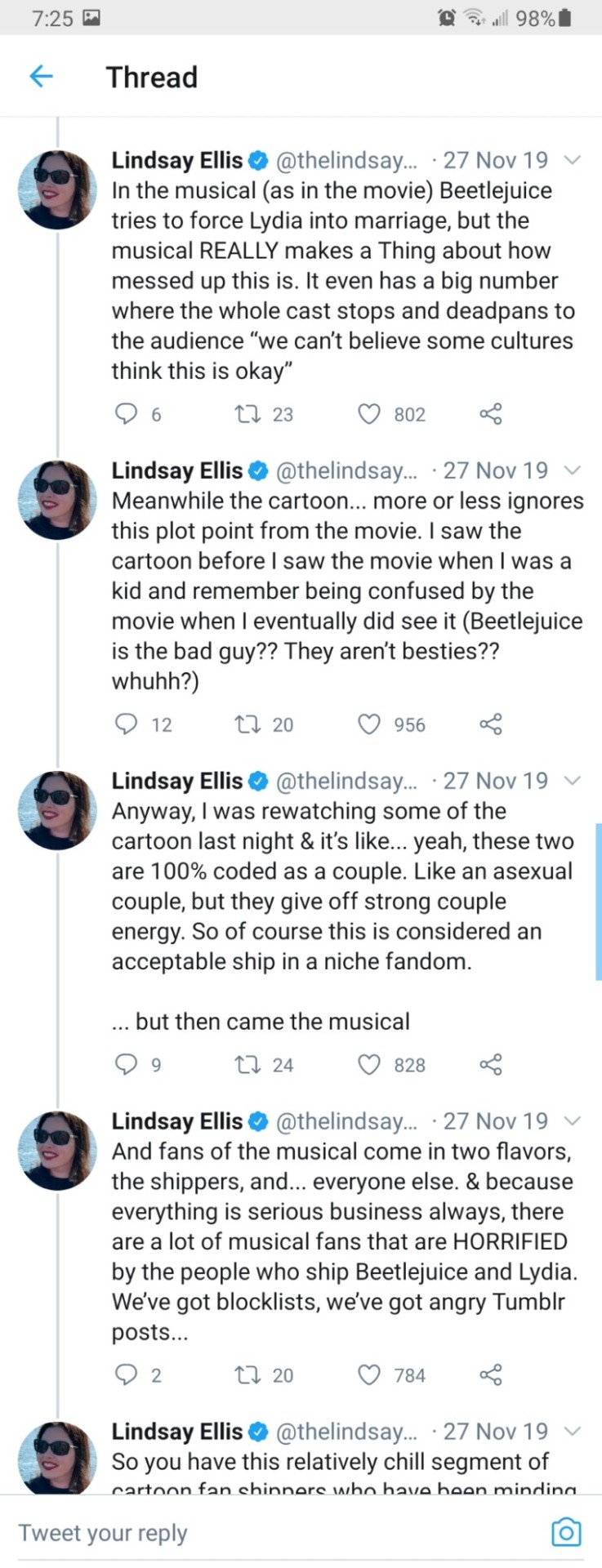
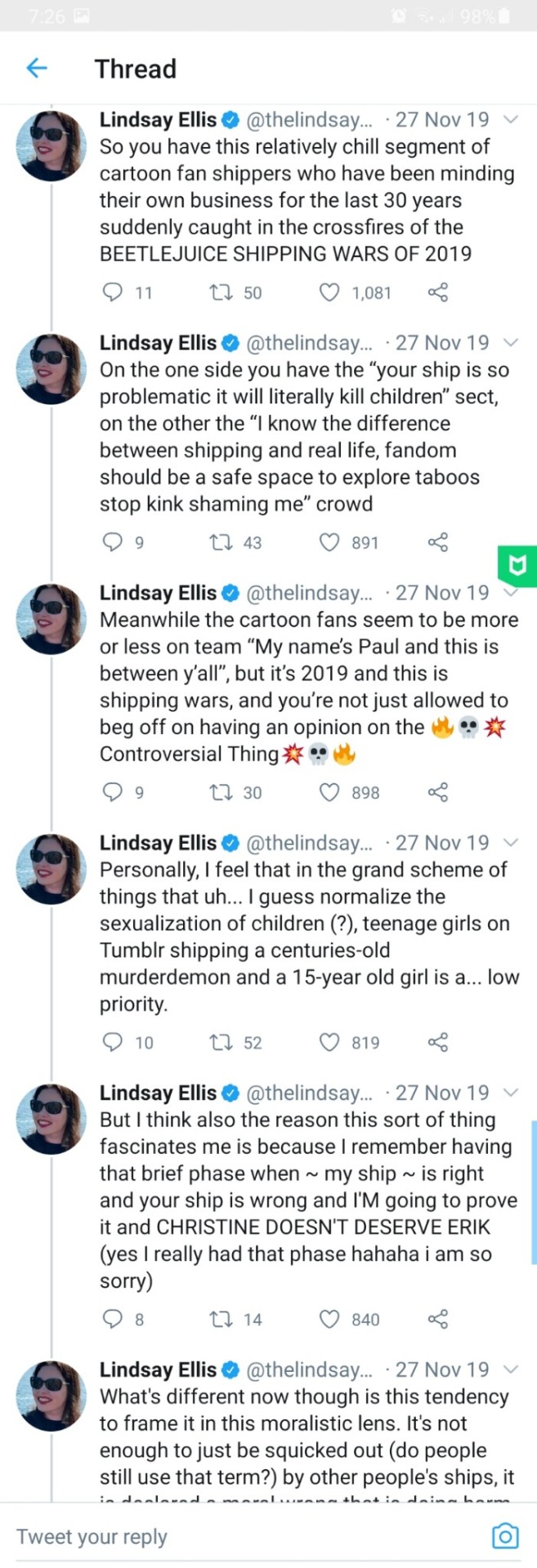
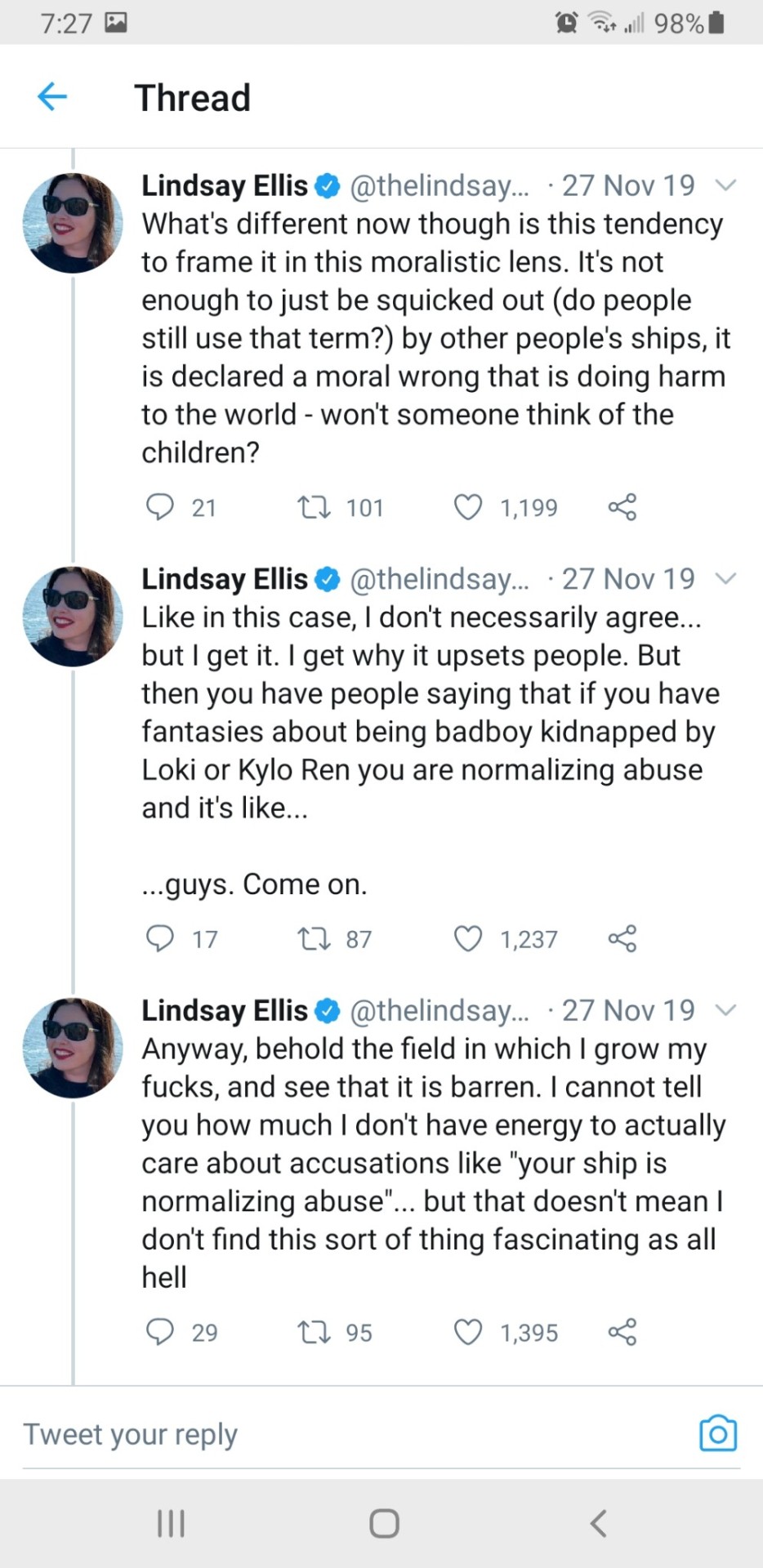
She also defended Stephanie Meyer's Twilight by omitting most core criticisms of the franchise like its glorification of child grooming, racism, and misogyny. Lindsay Ellis has some good takes, but she'd definitely be on friendly terms with Sessrin shippers and others of their ilk.
I don't really feel like what she's talking about in the screenshots and this situation are all that comparable, though. First of all, in the Inuyasha series, Sesshoumaru and Rin aren't coded as a couple, especially not in classic RT style. There's not really a concrete definition to the relationship at all, which enables a lot of different interpretations, as opposed to the coding leading one to a certain conclusion.
Second of all, the Beetlejuice cartoon and the Beetlejuice movie resemble each other little more than name and character design - in the screenshots, LE talks about how she was initially a little taken aback by how different the characters' relationship was in the movie vs. the cartoon, and how the cartoon fans would ship them in the context of the show because that's how it was presented to them within the context. There's a discrepancy there not because the relationship is coded ambiguously in canon, but because fans are dealing with two totally separate and distinct codings that have little to do with one another. The movie and cartoon are so incompatible in tone and context that it's impossible to reconcile the two into a cohesive canon, so the shippers and anti shippers may as well be talking about two entirely separate things (which they are). In Inuyasha/Yashahime's case, however, the latter follows from the former, they're supposed to represent one long contiguous timeline, and so the dynamic between Sesshoumaru and Rin in Yashahime would have to be based upon that of what it was in Inuyasha, which is where antis in THIS sphere have a problem. It's one thing to have two different fandoms of two different stories entirely where one is very loosely based on the other warring with each other over details that were wholly different from one another (Beetlejuice). It's another to have a direct continuation of a series that may or may not imply some pretty iffy dynamics based on a grown man getting with a girl he has authority over when she's older (Inuyasha/Yashahime).
Third, LE characterizes the shippers of the Beetlejuice fandom as largely peaceful, mostly keeping to themselves until an anti wanders into their midst. In my experience, it's been the opposite in this fandom. I keep on the anti tag, have only posted once in the ship tag (to boost a post that had both ship and anti arguments on it), and don't go looking for fights. I've been getting quite a few shippers demanding in various ways that I shut up and refrain from stating my opinion on my own blog multiple times now. I may be wrong, but given the circumstances, I think that LE might have a less-than-favorable view of the shippers in this fandom for having a similarly militant pattern of behavior to the antis in the Beetlejuice fandom. It's not necessarily the opinion that I see her criticizing in the screenshots (she even says she understands how the content can be upsetting), but the way one invades spaces that are not theirs to insist that someone isn't allowed to have the opposite opinion.
And, at the risk of repeating myself yet again, I actually DO NOT have a problem with the existence of the SessRin ship. I have ignored it for years, and will continue to ignore it for years to come, no matter what Sunrise wants to validate in their sequel. I just have my blog to express my opinion, help commiserate with other antis, and assert that it isn't unreasonable for anyone to read Sesshoumaru and Rin's relationship as platonic. So, actually, I mostly agree with LE in her dismissal of people "supporting" abuse by liking a ship. My issue is with Sunrise if they decide to put positive depictions of grooming in a show for children, but as far as the shippers in the fandom go, I really have no problem with them shipping. Theirs isn't an invalid interpretation either, given all of the surrounding material in the world promoting it. We can coexist, disagree, and still be fine. At the moment. Shippers don't seem to WANT a peaceful coexistence with me, but I think eventually they'll get bored of fighting over nothing.
As for LE's defense of Stephanie Meyer, it was specifically a defense against all the unfair, misogynistic attacks on her for writing something popular with girls and women. She didn't say there's weren't VALID criticisms of Twilight; she just said she was sorry for buying into the intense unwarranted hatred of Twilight and Stephanie Meyer for nothing more than our culture's general disdain for anything that girls like. I'd like to think she really didn't need to make the video where she listed and elaborated upon all the problematic aspects of the Twilight series, because quite frankly, that video already existed in multiple iterations long before she made her own.
Finally, I think it's important to note that I'm 32 years old and not really interested in "stanning" or "emulating" anyone at this point. A couple of anon messages stated they thought there were similarities between myself and LE, and while I am flattered because I think she has some valuable and insightful opinions on fiction, I'm far past the point of trying to be like her or thinking she's flawless. I do have some disagreements with some things she's said before; I don't have much interest in listing them out here, but suffice it to say you should have no worries whatsoever that I would blindly follow her example on every little point. Nor would I suggest anyone else do so. I just like watching her videos, think she has a cool perspective, and am flattered to be compared to someone who it looks like has been pretty successful in writing and publishing a novel, as that's kind of a goal of mine.
#asks and answers#anti sessrin#i guess i was a little too gushing#at being compared to lindsay ellis#i gave the impression i was a super fan or something?#my bad lol
31 notes
·
View notes
Text
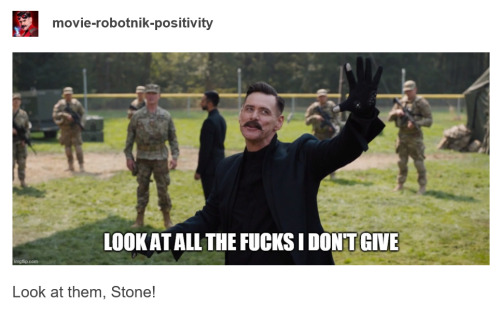
Yeah, no fucks to give here!
Really not into this ship - at least not in a romantic & sexual context.
—
At this point, I think it is best, if I put a little clarification here, before I continue:
This is just about my personal opinion, theories & headcanon - and by no means lays a claim to general validity (nor does your POV, btw).
I have more of a pick & choose approach to fandom subjects, anyway, so I can customize the experience exactly according to my needs and wishes. This is fiction, after all - the realm of endless possibilities - where anything goes, and where there is a place for the preferences of all of us.
That said, I really want to point out that I have nothing against people shipping the Dr. with Agent Stone - but since I, personally, prefer m/f ships, I’d rather choose the female OC approach, as it’s also my beloved villain x heroine constellation (not the subject of this post, though).
My take on the dynamic between the Dr. and his assistant is, therefore, quite a bit different from the fandom popular one. Well, to each his own.
What this post definitely is not, is an invitation for a debate regarding character interpretation, shipping choices, etc. - and all the potential drama that this might entail. If that is what you’re after, then I’d politely ask you to leave now, because all you are doing is wasting both of our time.
Let’s just agree to disagree and move on, k!?
I do my thing and you do you, guys!
I suppose, I made myself abundantly clear now.
—
Anyway, to return to the topic …
Where have all the male friendships & professional partnerships in fandom gone!?
Because, personally, I think agent Stone rather relates to his boss on that level…
Robotnik being a role model of some sort, that is - not unlike a kohai & senpai, or a younger & older brother constellation, actually - where the former looks up to the latter due to certain traits that he admires (and Stone certainly does). Regarding the age difference of the two, this could also make sense.
I’d estimate that Stone can’t be much older than his mid-twenties at most, since he’s in the position of a junior agent and assistant - still at the very beginning of his career path. And he’s very capable, disciplined and professional, at that, which is probably why he made it as Robotnik’s assistant at all (unsurprisingly, given the man isn’t the most patient).
Speaking of whom - I think, regardless of Jim Carrey being in his late fifties at that point - he, himself, can’t be that old, actually. My personal take (& preference) here would be late thirties, which would still make a lot of sense regarding his academic and occupational career. Being this overachieving genius, I guess that he finished school in time-lapse mode, skipping one, or even more grades - same goes for uni. Therefore, it wouldn’t surprise me if he was done by the age of 25 - his five PhDs included (bet he did two at once), which would still give him plenty of time to make his way as an agent and scientific government official up to the time of the events of the movie.
Aside from that, I can’t help but see parallels to the dynamic of Piett and Vader here, as well - a mixture of professional esteem and a bit of intimidation. But certainly no outright fear, as Stone is hardly under the threat of being strangled to death by his superior, like poor Piett is.
That is not to say that Robotnik’s still frequent misconduct towards him is ok (it definitely is not), but it certainly is more mild than he behaves towards, say, pretty much anyone else. Btw, that includes the “pin yourself to the wall”, grabbing him by the bottom lip and dragging him towards himself, while glaring at and chiding him (For what exactly!? Not being perfect, or as smart as him!? Chill, man, the boy is doing his best, and he’s doing a good job!).
Fandom, of course, does what it always loves to do - construe this as “evidence” for the alleged attraction between the two, which is pretty far-fetched, imho (…although you’re surely free to interpret it this way, if you so please. As I said, this is just my pov & to each his own. *shrugs*).
Anyway, you can clearly see Robotnik displaying this type of behaviour, along with the invasion of personal space, towards other male characters as well - be it “Major Nobody Cares”, “Officer Brainfart”, the big bar dude he threw out of the window, or Tom Wachowski. So, following this line of argument, does that mean he’s into these guys, as well!? Honestly, that’s pretty ridiculous!
If anything, it is a blatant display of asserting dominance, bringing the message home that he is the alpha male, while putting his opponent / subordinate in his place - and that’s it! What this behaviour definitely is not, however, is something remotely shipping related.
Besides, there are many examples of other male characters doing this for similar reasons, too - amongst others Darth Vader (remember that scene between him and Orson Krennic!?), and Severus Snape (after Harry invaded his memories during the occlumency lessons). And Robotnik does that quite aggressively in the cases above. In fact, it seems to be a fairly consistent behavioural pattern with him (not that he actually needed that though, but that’s an entirely different matter).
As for Robotnik’s personal attitude towards his assistant, I think Stone’s one of the very few people he actually respects, and even likes, because the young man’s esteem for him is so genuine, while everyone else regards him pretty much like nothing more than an asset, or a threat.
It’s not like he doesn’t somewhat encourage being kept in that position himself, behaving like he does - aside from actively reducing himself to his intellect & academic prowess. This isn’t all that surprising, as it is something he apparently gets his entire sense of self-worth from, and likely the only thing he got any appreciation for from others, which is, perhaps, also why he constantly needs to spotlight said trait (no behaviour someone truly at one with himself & his abilities would display, btw). Then, there is his little tolerance for failure - especially when it comes to himself. He truly expects to perform flawlessly, like a machine, and when he doesn’t, that really seems to unsettle him (that face when Tom points his unsuccessful attempts to catch Sonic out to him … he was so offended, he almost looked like he wanted to cry ^^;;).
So, of course it is likely that he becomes quite attached to the sort of attitude and behaviour that Stone displays towards him, even though he wouldn’t think of it this way - because, you know, emotional bonds with other human beings obviously are beneath him (Yeah, sure, we did see the veracity of that claim afterwards, didn’t we!?).
But, then again, growing up as an emotionally starved child and adolescent, used to being brushed aside, and, later, deliberately distancing himself from other people, he actually might have no clue whatsoever how to appropriately deal with things like these, and thus brushes them aside as “weakness”, which really does make sense, especially in the context that he was bullied as well.
Same goes for him eventually adopting the habit of pushing other people away via plain disagreeable behaviour. I think this phenomenon is called “hedgehog’s dilemma”, and it is quite ironic that he is more afflicted by it than his blue nemesis.
It is so painfully obvious that this guy has some massive issues, stemming from past emotional neglect and negative experiences - so much, that he even rejects all things human altogether, along with his own humanity.
His excessive idealization of and identification with technology, therefore, comes quite in handy as a defense mechanism in order to cope with said experiences.
Machines don’t ask much of you, they do what they are told, they are predictable, and they - above all - can’t suddenly abandon, betray, humiliate, and hurt you (which, I think, is the crux of the matter here).
Even though he might claim that his robots are everything to him, and that he doesn’t need anything and anyone else - his actions, however, prove otherwise … let alone his constant spiteful remarks on the matter, which just sound so damn bitter.
We can recognize that quite clearly when he is forced into involuntary seclusion on that mushroom planet at the end. This is where we see that what he truly is missing are not his machines (I bet he could have easily built a robot to accompany him out of the wreckage of his vessel), but one of the few people (maybe even the only one at that point), that he had apparently grown to value as worthwile company - namely agent Stone.
And, yes, it is very evident that he misses him (platonically, for me - but this isn’t even the point here) - he even tries to make a rock resemble Stone’s likeness in order to have someone to “talk to”, and mimic the social interactions he had with him.
Essentially, all those objects and machines are but a substitutive gratification that he tries to use, but that never come remotely close to the real deal, let alone are ever able to replace it.
In the end, he’s still a human being, along with all the human needs that go along with it - human contact and care included.
If the psycho-social and emotional makeup of his closest known relatives is any indicator to how his own might be structured - and it usually is (I’m speaking about the nature aspect, not nurture) - then he can’t be such a bad guy, after all - at least not inherently.
Taking his grandfather Gerald Robotnik, for example, who loved his granddaughter Maria (a total sweetheart) so much, that he was willing to do anything for her, in order to heal her from the fatal illness that was afflicting her - and who literally went insane with grief after losing her - then it shows someone with a strong emotional life, who feels what he feels very keenly and deeply. Furthermore, he is also someone that happens to bond very selectively, but if that is the case, it has this virtually absolute quality about it, with a love just as intense and profund to match (which is quite beautiful, actually).
On the other hand, though, that can also mean someone that has a high degree of emotional vulnerability, and who, therefore, is susceptible to sustain lasting damage from interpersonal traumatic experiences (which happens to be the case here, imho).
More often than not, it is this type of person that is likely to cork up their feelings and harden their hearts as a result - and who use every opportunity to deride the very traits, needs, and wishes they worked so hard to push away, if they see them in others. That is, amongst others, what gives them away. It’s pure projection - which is why I think that his caustic remarks should definitely not be taken at face value.
There are many, many examples of villains (or anti-heroes) that fit this type. Robotnik would hardly be an exception.
Besides, it is nice to see that Jim Carrey seems to have a fairly similar take on that matter (not that I actually care, but still):
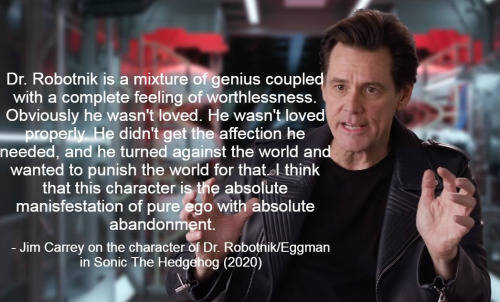
“… and all it really comes down to is, he wants to be special to somebody, only it’s gone megalomania for him.” [x]
Ouch! Poor guy, actually.
He seems a lot like Ozai in that regard. No wonder I dig this dude (aside from him being hot, that is, haha) - he’s totally the type of villain I fancy.
And also, like it’s the case with Ozai, I can’t help but wonder about his past, given there is known so little about it (aside from a few hints), so the following will be about some of my personal theories and headcanons about him, his family, and his past.
These are such important characters (main antagonists, no less), yet the creators can’t bring themselves to be more specific about the most basic facts concerning their families. Ugh, huge pet peeve here! Nobody expects a huge ancestral chart down to the tiniest details, but they could at least offer more info about their closest relatives - especially the parents, who happen to have the most formative influence on a person.
How old was he, when his parents died, anyway!? That they died seems pretty much a given, as that is what being an orphan is about, per definitionem (and he referred to himself as such). But how did they die? Did he witness their death, or was he absent?
Personally, I have this theory that their demise might very well be linked with what happened to his grandfather Gerald Robotnik, and his cousin Maria. Perhaps they were on that space research colony during the military assault, and were also amongst the “collateral damage” there.
From what I read, the recruited scientists lived there, so I reckon that they did bring their families with them, which is likely, since it is said that Maria was born there, so at least her parents must have lived there for an extended amount of time, as well. Since Ivo isn’t Maria’s brother, but her cousin, Gerald must have had at least two children, who lived alongside him (… and his wife!? No info about her, either.) on that station.
While I think both of Ivo’s parents were from prominent scientist families (after all, that is what the population of this space station was comprised of), it is still unclear whether or not they remained on that station. I am inclined to believe they might have split their time between there and Earth, as Maria and Ivo don’t appear to have been particularly close, such as, for instance, her and Shadow (who was pretty much her only friend there), but I think that might also have been the case due to a difference in age.
Maria was 12 years old when she died during the military attack on the station. Since Ivo apparently seems to have no significant memory of his parents, and seems to have spent his childhood as an orphan, he can’t have been older than 3-4 during this incident.
With Gerald arrested, and pretty much the rest of the inconvenient Robotnik family gone, aside from that small child, I think the military decided to take him along, simply because of the vast potential of this child, coming from a bloodline of geniuses, that was now theirs to mold and to exploit.
They likely left the boy in an orphanage afterwards, mostly to his own devices, and without any support, or caregiver whose bonds transcended the mere duty of keeping their fosterling alive - a lonely life, largely deprived of emotional warmth and attachment.
However, they did keep him under close monitoring, so they could intervene anytime they saw fit, to stir him in the direction they wanted - like a psychological experiment of sorts. I remember that in the movie the presiding pentagon guy referred to him as “a lab rat with teeth” - which is rather telling regarding how they perceived him, and pretty nasty, considering the implication.
The Robotnik name, though, they obviously did not refuse him - a decision they would come to regret later. While this allowed him the only tie to his ancestry, their legacy, however, didn’t do him much good.
Gerald Robotnik was a disgraced man, known to the world as the genius madman, imprisoned and sentenced to death as a criminal - which was, by far not the whole truth. And yet, he was turned into this idealised picture of a hero by his grandson, who so admired his achievents and strove to become a scientist because of it, despite knowing only the official version of the story.
The tainted reputation of his grandfather would haunt Ivo for a long time to come. It would also become the lens through which he was perceived and judged by the world at large, and this turned out to be the main reason he was rejected, and, furthermore, relentlessly bullied by his peers - irrespective of his own accomplishments, which earned him at least the praise of his authority figures.
That he eventually snapped and retaliated, did not exactly improve the situation for him. While the bullying did stop for the greater part, the peoples’ suspicion had turned into fear, as their concerns had come to pass after all, and, as a result, he was shunned even more.
In the following years, he was further on groomed to become this perfect military asset - a morally unchecked scientist and ruthless agent, that the government could deploy like the weapon they undoubtedly saw him as.
Unfortunately for them, however, their experiment didn’t quite have the outcome they had anticipated, as he not only exceeded their expectations on an intellectual and scientific level, but, at the same time, became increasingly unstable, unpredictable (”psychological tire-fire”) and, hence, potentially dangerous - to such a degree that they became very hesitant to deploy him at all (despite the “perfect operations record”), and even downright terrified of him.
Frankly, I think they’d also have ample reason to be afraid of him, other than just his obviously ambitious nature. The most prominent being a possible event, where he finds out about what truly happened to his family and himself, as well as their role in this. Needless to say, that he wouldn’t take this lightly, considering all the shit he had to endure because of it, and likely seek revenge. I’d really be curious about such a scenario.
#Dr Ivo Robotnik#Sonic the Hedgehog#movieverse#headcanon#personal opinion#not interested in a debate here#that is what rl subjects are for#fictional world is purely for wish fulfillment and processing stuff#I am merely looking for like-minded ppl here and those with a similar taste
5 notes
·
View notes
Text
Killing Eve ― 3x06 (Review)
The time has finally come for yet another review. I can’t believe we only have two more episodes and it will be the end of season 3. Seriously, Killing Eve should AT LEAST have 10 solid episodes per season as most of other shows do. It would be just enough content (more than we get now) and without having to stretch things out. Now, theres A LOT to talk about, so I’ll try my best to touch upon as many things and details as I can! So sit back, grab your tea/coffee and let’s get started!
Title cards
I covered this topic back in 3x04 review, but they did it again, and this time the title card game is somewhat different. It’s really apparent that they are experimenting with editing and trying new things and that’s good, because we know that not only they want characters to develop, but to improve and change the editing and production of the show itself.
It was a bit unusual when they swapped from location titles to character names back in 3x04, but this time it was actually fun. I mean “PISS OFF FOREVER?!” This cracked me up sooo bad, I had to rewatch it several times lmao!! And don’t even try to tell me that they left Niko alive for THIS. It’s not the first time he rejects Eve and wants to get away from her, so what is the point of that scene with him? We didn’t get any new information or knowledge. So... I’ll call that waste of precious screen time which, in this case, should be dedicated for Eve’s personal character story because hell, she’s the one who deserves it the most.
Then they did it again with CUBA/NOT CUBA and honestly it cracked me up, AGAIN! I actually loved they did something like this, even though it kind of gave this comedy type of feel knowing how dark and complicated this show actually is. And of course the “THIS IS BULLSHIT” was exactly what Oksana said at the meeting with Helene not so long ago, so them reflecting on that and showing the phrase as a title is so relatable and at the same time kind of expresses how Oksana feels and what she thinks.
So far they haven’t really decided as to what kind of editing style they are going for, but I do hope that at the end of this season they realize how they will carry the show onwards starting with season 4, because them keeping this up and changing things constantly is not a good thing. Many people find it annoying and really, they aren’t used to any of that, so I hope season 4 will have a more consistent style when it comes to editing and carrying the main storylines, ect!
Niko (ft. Eve)
There isn’t really much to talk about here, other than... Niko being alive makes NO sense, whatsoever. I personally wasn’t expecting to see him being killed off or anything similar to that, but since they basically PITCHFORKED him, just let him die, okay? There is NO way he could’ve possibly survived something like this and that means they have to have a VERY big reason that would, you know, justify him surviving so fans can “ignore” the fact that it doesn’t make sense to begin with. So far, they didn’t provide any reason for that. Niko didn’t say anything useful to Eve... nor did Eve. She was just rejected again and had a confrontation with Niko’s uncle, I believe. Wow, someone of his family members don’t like Eve. What a shocker, right?
One of the very few options that I could see happening and making sense is for Niko to be alive and for Eve to make a decision and choose Villanelle over him. Not because she lost everybody and she’s the only one she has left, but to be able to choose her because she WANTS to. Instead, what did we see? We saw a very desperate and determined Eve who’s willing to go that extra mile to find whoever hurt Niko. Despite everything, a part of her still has hope for them even now so maaybe, after those fancy “PISS OFF FOREVER” words, Eve will finally come to her senses? Even though most of following scenes had her feeling the same way. So I really have no idea what else to expect and why Niko is still there.
There’s also a theory going around about how Eve should pull the plug and kill her husband lol. I mean, that way, their conversation from the very first episode about how Eve could kill Niko and that storyline could come full circle, but given what we saw of Eve and her values and mental state.. yeah I don’t see her doing that anytime soon, or ever, in fact. She’s still clinging to Niko somewhat and she must go REALLY wild and dark in order to do something like this. Though, I must admit... I kind of would love to see it as well! At the end of the day we all want dark!Eve to rise... and she is getting there, believe me!
Villanelle & Helene
I’m very conflicted about this duo. Especially after watching the promo/preview of upcoming episode. Yeah... I’m just going to throw it out there. I think Villanelle will end up killing Helene. The meeting wasn’t exactly successful, as Dasha of course lied to Villanelle about having all the control or probably, the description of a Keeper is quite different to Helene and Dasha than what Villanelle already knew about it thanks to Konstantin. So.. could it be that back in 1x07 Konstantin lied to her? Or that Dasha told Helene something different to get Villanelle in line and believing she is actually “moving up” in the world? Honestly, still much to think about.
I LOVED Villanelle’s, or should I say, Oksana’s outfit during the meeting and especially how big of a mess her hair was. I mean the hair perfectly reflects her inner state and yeah, she IS a mess and she has every reason to be. Someone previously mentioned how Villanelle was the one who went to Russia, but it was Oksana who left it and now I’m starting to really see and feel just how true it is. I mean this episode was almost all Oksana, except a couple of moments where she tried her best to keep her defenses up, for instance being sarcastic with Helene. “Are you trying to seduce me?” I mean... I wouldn’t mind them getting some.. buut, it’s not going to happen. Still, those lines were hilarious as much as they were iconic and yeah, in that moment she was trying to play her main character, which is Villanelle but as soon as she spotted the post card it was over. Oksana took over and she freaked out. The bad thing about this is that she is very emotional and very vulnerable right now, her mind and emotions are all over the place and that could be why she didn’t really think about Dasha being the one who lied to her? Or maybe she did think about it but we aren’t aware of it yet? This can’t mean anything good and I am honestly concerned for her.
What else I noticed from that scene is that Helene was quite open in terms of deciding to speak to her daughter I’m guessing, in front of Villanelle while not really you know, feeling like she could be in danger? Despite the fact that she is literally standing in front of a killer. I guess she is really used to that and her job is meeting a lot of assassins and other dangerous people? And then there is Villanelle who keeps asking her all kinds of questions, silly or not, she did ask whether Helene was her real name and yet she didn’t answer. In fact, she didn’t answer any of Villanelle’s questions and that is again, concerning. So maybe Helene isn’t her name, but that’s kind of ironic, knowing that Villanelle isn’t really her name either. So yeah, seeing Helene be so...cool around Villanelle especially while she was freaking the fuck out should say something and that probably means she knows exactly how to handle such people and situations like this. I’ll definitely keep my eyes on her from now on.
Eve
Our precious Eve is finally getting some quality screen time. Not enough, but at least she’s getting some. What I absolutely LOVED about her in this episode is just how confident and sure she is about Villanelle not being the one who hurt Niko. Yeah, let’s remember that the last time she and Villanelle saw each other was on the damn bus where they had a major fight and a kiss. That was Villanelle and she was such a smug asshole there and everything and thinking about this now, it’s completely different person from who Oksana is and it’s mindblowing actually. So to think that Eve didn’t consider Villanelle being the one who hurt Niko, despite there not being ANY evidence that state that is just... their connection is simply incredible. No matter how many times Villanelle and Eve end up hurting each other, they STILL have this hidden trust within each other that I find extremely fascinating and then Eve gets the photos of Bertha Kruger and of course, that’s what Villanelle was doing while Eve was in Poland coming to visit Niko. I’m glad that there is this alibi in Villanelle’s defense to show that she was doing something else, KILLING someone else at the time and the fact that Eve thought that it was Villanelle who killed her, even if she did it in a “nice” way... is beyond me. There is really no one else who knows and understands Villanelle/Oksana better than Eve. Period.
Another important aspect that is worth mentioning is the fact that the writers are kind of robbing Eve of screen time and character development. We haven’t seen her much this season and especially during the previous couple of episodes and even in this one it seems like Carolyn got more screen time than she did and Villanelle as well, who JUST had her solo episode, which is kind of unfair. However, I do think Villanelle deserved to have her own episode now since her character is going through such a huge change, meanwhile Eve is going through her thing, but it doesn’t feel like it’s as huge and as extreme as it is for Villanelle. At least that’s what they’re showing us. But yeah, I think season 2 was way more about exploring Eve’s inner darkness than this season, which is more about acceptance of her dark self and her feelings for Villanelle. Let’s just trust the writers and see how they will handle Eve’s character during the next remaining episodes and only then we can actually judge the crew and the lack of screen time Eve received, because really, what I noticed this season is that Suzanne really wanted to show EVERY character and so far she has been sucessful in that for the most part, with one flaw, that is the screen time management and yeah, we shall see how that aspect is handled in the next episodes!
Villanelle & Konstantin
So we got the hockey game scene. I’m glad to know that Konstantin didn’t set Oksana up by sending her to some strangers. One of the highlights of their conversation was Konstantin’s comment about Oksana’s mother who he thought was INSANE rather than evil and was hoping for Oksana to awknowledge it instead of killing her. Guess she didn’t really consider it as an option? But does that mean then that Oksana as just as insane and isn’t aware of it just like Tatiana wasn’t? At the same time we know that Oksana KNOWS there is something wrong with her, at least that’s what everybody else keeps telling her, so I wouldn’t call her insane. At the same time seeing that Konstantin wanted to give this chance for Oksana to get some kind of closure by being with her family and especially her mother does show just how much he cares about her. Until... their conversation shifts. Again.
So apparently Oksana knows about Konstantin’s plan to “get out” and she is suddenly interested in joining him. Now this part of the conversation PAINFULLY reminds me of their last interaction of season 2 finale. Especially the part where Konstantin chooses his family instead of Villanelle, who is ALSO his family, whether he admits it or not. They might not be related by blood, but he IS her father and seeing not only her own mother reject her but her father as well will do things to you. So again, Konstantin leaning towards choosing to leave with Irina and leaving Oksana behind only to promise her that he will come and get her is not enough. He betrayed her several times... he left her at the prison in season 1 even though he “tried” to get her out of it. He betrayed her at the end of season 2 by choosing his family over her, and now... now it feels like ANOTHER betrayal is coming and to be completely honest I don’t think Oksana can handle so much rejection at the moment. Of course, Konstantin can’t just pick Oksana over his own daughter, but it’s wrong to play with her like that. She killed her own mother and left her blood family in order to get back to her REAL family who is Konstantin and Irina and neither of them show enough of determination to bring her along which really saddens me. I mean Oksana went through enough as it is... I’m not sure how she will get through this if Konstantin will leave her again... and I won’t have it either. They better not do it again.
Villanelle & Irina (ft. Konstantin)
I just love, love, LOOVE these two together. I mean 1x08 is one of the most iconic Killing Eve episodes and they are the biggest reason why. I’ve been waiting for them to get together again and those a couple of scenes they got to spend together didn’t disappoint. I LIVE for their interactions. I mean what can be better than two sisters bonding? Especially when it’s Vasiliev sisters. Them fighting like true siblings do, having fun while both of them having this insanely chaotic driving session and at the same time touching upon going to CUBA as well as finding out Irina’s feelings towards her own mom and her boyfriend, who Villanelle doesn’t see any reason NOT to encourage her to kill him lmao! I mean, first Irina sarcastically calls Villanelle a “real role model” and 15 seconds later she is literally driving over her step-father LOL! I mean... I am SO proud of her. She really did take her sisters advice on this without much of thinking and at the same time I am kind of concerned about her. We all saw Konstantin’s reaction to her driving over the guy and well... that’s not exactly the best thing to do.
In Oksana’s defense, I do think she was trying to be helpful in giving Irina this advice, since we all know that’s how she normally chooses to solve problems. By killing. Plus, I don’t think she actually expected Irina to take her advice either way. Let’s take Tatianas case for example. Yes, it’s a lot different because she was mentally abusing Oksana for years and there was lack of affection and all that, so Tatiana definitely deserved it. In Irina’s case... she’s just “disgusted” of seeing her mom with her boyfriend all the damn time and I don’t think she should’ve killed anyone for that. Besides, she was already preparing to leave with Konstantin so what’s the point? She wouldn’t have to put up with them anymore, yet she did it anyways. And what stands out for me about this is that we see Oksana not wanting to do any of that anymore, no more killing, just wanting to get out of this assassin thing meanwhile Irina just had her first kill. Kind of beautiful in a way, of having one of them ready to quit this way of life while having one of them indirectly influence and push the other into the beginning of such dangerous path. And from the looks of it, Irina didn’t seem to feel bad for driving over her step-father, like AT ALL. So I wouldn’t blame Oksana for the whole thing. Yes, she planted the idea in Irina’s head but it was her who actually did it and didn’t feel bad about it.
This whole dynamic just makes me want to remember the lunch scene in 1x08 where Villanelle asks Irina “Are you a bad person?” “I don’t know yet” well, guess now we are starting to see the person she is becoming and yeah I don’t think any of us saw this coming, that their previous conversation could be a foreshadowing in this way!. I’m VERY glad they decided to bring Yuli back this season since she is one of fan favorites and like I said, the dynamic between Villanelle and Irina is just great!
Konstantin, on the other hand... guy is in serious DEEP shit this season and now having to witness his actual daughter kill someone... yeah, I think having to handle Oksana is complicated enough and she alone manages to drive him mad so now the idea of having TWO mentally unstable daughters... yup, it’s time to do something about this. At the same time I kind of see the parallel between Oksana and Irina and how they could be reflecting one another. Tatiana wasn’t there for Oksana most of the time and didn’t show her any affection, ect. Konstantin is of course not as bad as Tatiana was, but the fact is, is that he is not really there for Irina. She’s not really getting as much of his attention and love as Oksana gets from him since she’s so demanding. So it makes sense for Irina to become more like Oksana, having them both be neglected by their parents in a way.
ALSO!!! Is it just me or is Konstantin the FATHER of the entire show lol?! A lot of people thought that he might be the one who killed Kenny. Now, all out of sudden he might actually be his father?! Yes, the thought did cross my mind but I never expected them to address it in that way. So... based on Carolyn’s forried look and silence that followed afterwards... this is the confirmation? Konstantin is Kenny’s dad then? Or maybe Carolyn isn’t sure of that either? Life is SO much more complicated in Killing Eve, I swear lol! Then there’s the thing with Geraldine... not sure where they are getting with this yet. Feels like we don’t really know anything about Geraldine just yet and really.. so far it just seems like she has daddy issues which could explain her amazing bond with her father and him not being there anymore. (I assume he died). Funny enough, we see Oksana having mommy issues. Yes. It is a thing now. And I’m not very excited to see where Konstantin/Geraldine thing is going...
Carolyn (ft. Geraldine)
We finally get to see Carolyn uncovering more information about Kenny’s case and actually it brings more questions than answers if you think about it. Kenny calling Konstantin, him possibly being his father, Geraldine kissing Konstantin and so on. This is suuch a mess.
The long awaited conversation with Geraldine gave us more insight as to why Carolyn is so cold towards her daughter and I get it. Really. What I don’t realy get is the fact that Geraldine decided to not mention Konstantin coming to visit her while insisting her mother to talk about Kenny. If she wants them to be truly open about things and just have a honest conversation, she has to open up about other things as well. That includes Konstantin. And gosh, she better tell the truth in the next episode because I’ve had enough with all the lies. Plus the season is almost over and we hardly know anything about her. Please, Suzanne, don’t let us down on this!
Eve & Dasha
I just love how easily Eve teleported to Barcelona lol! I’ve been also waiting for their face off and it happened. I was expecting something a lot more... crazier, physical, but all they did was basically annoy each other by fighting over VILLANELLE and their importance in her life while having this bowling match. The fact that Eve has NEVER done it before makes the whole winning aspect sooo much more delicious and come on, Eve just HAD to notice how Dasha missed one of her strikes as soon as she mentioned that Niko was still alive. Makes me wonder if its THAT easy for someone to throw Dasha off her game, yet she’s soo narcissistic and so ahead of herself.
Eve’s trust in Villanelle continues to AMAZE me, like no matter what Dasha told her she STILL denied all of her bullshit as if it was nothing and that is coming from someone who had only met Villanelle a handful of times. This is such a nice parallel to season 2 finale where Carolyn told Eve that Villanelle wouldn’t do the same for her. Not only did Eve figure out who Dasha was and that Villanelle was working for her, but she actually went to Barcelona to confront Dasha like that and call her out without much of hesitation. Again, Dasha mentioned “killing” Eve and that is concerning. There is a reason Carolyn told Eve that Dasha ended up killing one of her own... and that, I feel, is huge foreshadowing for upcoming episodes. Dasha IS the problem and she will cause even more. Honestly, I’m afraid she might do something to Villanelle or Konstantin for that matter. After all, she DID kill one of her own to save her own ass and I bet she can and will try to do it again.
Villanelle/Oksana (ft. Dasha)
To put it lightly, Oksana is a mess. She is going through a LOT. We’ve never seen her this vulnerable and emotional before and she has EVERY reason to feel this way. Now, it is sad that people seem to be struggling to separate Villanelle from Oksana. Like I’ve mentioned in my previous post, this episode was almost 95% Oksana and the rest 5% of her trying her best to look somewhat like her old self mostly at the meeting with Helene and during her next kill. After killing her own mother, she doesn’t see or feel the same way about killing. At least not right now. It’s a lot more difficult for her to turn her emotions off now that they are so intense and she can’t focus clearly. She is becoming sloppy at her job and she doesn’t want to do any of it anymore. Now that I’m thinking about it, we’ve seen more of Villanelle so far than we have of Oksana. The previous two seasons we saw only this confident persona that Oksana has created with several occasions where her real self comes to surface. And this season it’s all about peeling those layers, of slowly peeling away Villanelle and getting to meet Oksana. So, we are sooo used to seeing Villanelle in action, her interact with people that we can’t see her being emotional, let alone crying. It’s not like her. Because it’s NOT her. It’s Oksana and don’t know her enough to know what she is like and what is in character for her. Truth is, she is vulnerable, hurt and in pain. She is going through the death of her mother, the loss of her family, the loss of control and being manipulated (again) by others in doing something for them. It all was building up and now she can’t escape those feelings anymore and she wants to quit.
I feel like this time she REALLY means it. She really wants to quit and she is willing to give away EVERYTHING. The apartment, the clothes.. and EVE. The first time I’ve watched the scene I got really concerned and scared... because that means Villanelle is willing to leave Eve like that. At the same time I started to realize that this is sooo much bigger than Eve or them being together. This is Oksana wanting to have a new life... and she wants it so bad, she is willing to leave Eve behind. This, right here.. it called CHARACTER GROWTH and I am soo proud of her for reaching this point, of wanting this life, wanting something for HERSELF even if it means giving away everything she loves. That’s when you know she is being serious about it. So maybe this will turn out to be a good thing... maybe when Eve will notice and find out about this... she will be even more willing to accept her feelings for Oksana and they might end up just running away together because they can and because both of them want for this bullshit to end.
Now, Konstantin told Villanelle to NOT tell anyone about their escape plan. She promised not to do it but then she had a breakdown and ended up telling it to Dasha.Such a BAD move. I mean.. Dasha is the last person she was supposed to tell this to... and I’m sure it will cause major problems. Dasha will get someone killed and I don’t blame Oksana. She’s not in the right state of mind and really, if she haven’t told it to Dasha, we probably wouldn’t have as much action and drama happening in the next remaining episodes. So will see. But I really do hope Dasha will fail at whatever she will try to do.
I’ve probably said it plenty of times but Jodie Comer’s acting STRIKES AGAIN! So many powerful performances delivered each single episode, I am speechless and I really don’t know what else to say. Just see it for yourselves. She deserves another Emmy and more!
Villaneve screen time
This is not really a part of a specific episode review, but more like me wanting to point something out. It’s been 6 episodes already and we only got ONE Villaneve scene. The bus scene. The kiss scene. Yeah, it was mindblowing and amazing but that’s not enough. And something tells me they might not even meet in next episode.. only see each other at the very end of the episode and that’s on it’s own upsetting... I mean I dare to say, even season 1 had more Villaneve screen time than season 3 has. I’m not even talking about season 2, where literally they spend together half of a season together occasionally meeeting up. This show IS about them and their dynamic and how can we have it if they are not interacting together? I get that this season is more focused on character development and them evolving separatelly, but Villaneve still has to be a thing... and they better give us the entire finale filled with Villaneve quality content or else... after all, they ARE the main plot of the show for me and there’s that.
Overall Thoughts
Another solid Killing Eve episode. Since they have only 8 episodes, they can allow themselves to make such rich, intense and filled with information/action type of episodes and it shows. There were a couple of weaker episodes, but overall this season is getting stronger with each episode and I am very nervous as I am scared and excited for the remaining two!
As always guys, if you have any theories or thoughts about this episode, Killing Eve in general or anything else, feel free to jump in my ask box or message me directly, I’d love to chat!!
#ke spoilers#killing eve#villanelle#villaneve#eve polastri#jodie comer#sandra oh#ke s3#ke 3x06#ke review*#ke 3x06 review#ke*#creation#enjoy guys!!
117 notes
·
View notes
Text
Daisuke and Tagiru
Ever since Tagiru’s concept was announced, people have been comparing him to Daisuke, and, honestly, it’s hard not to -- in fact, considering that Xros Wars did certainly have some degree of trying to invoke stuff from older series, it’s very likely this is intentional! You have someone introduced as a junior to a prior protagonist, who wears goggles like him (and eventually inherits the senior’s pair), wears blue, has a blue dragon-like partner, is more hot-headed than said senior...
...and that is about where the similarities stop!
Still, I think such prominent base profile details practically beg one to make a comparison, so let’s dig in!
(Translations linked below are PositronCannon’s for 02, The Wild Bunch for Hunters, and L Subs for a Kizuna screenshot, unless otherwise stated.)
The junior-senior relationship
Both Daisuke and Tagiru look up to their seniors, and that’s probably the most well-known part about both of them, but I think the first major difference between the two is how they approach that admiration towards said seniors.


While Daisuke’s way of approaching Taichi can generally be observed through his tone and actions overall, the most clear representation is in 02 episode 8, where you get to see their relationship as soccer team junior and senior. The most consistent thing about this is that Daisuke is completely and utterly deferential to Taichi.
What does this mean? It means that, even when Daisuke is jokingly bragging about his skills, it only takes one criticism from Taichi to entirely shut him down. The degree to which Daisuke respects Taichi’s opinion and holds him in regard is in such high esteem that he completely defers to his judgment. He really, really thinks Taichi is that much cooler of an experienced person whose judgment takes priority over his own. Even in episode 39, when he makes his first major disagreement against Taichi -- that he wants to go help Ken in Tamachi instead of accompanying the others -- the way he phrases it is firm, but politely and respectfully, to the point it almost comes off like he’s asking for permission to go.
Tagiru, on the other hand...
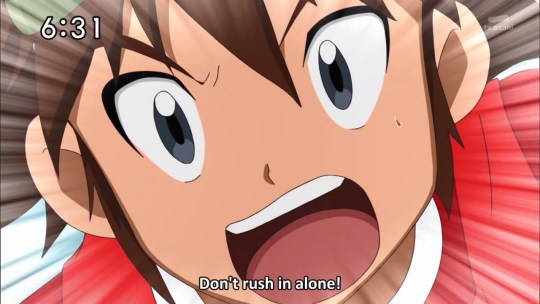

...well, his first appearance in the series involves disregarding Taiki’s advice. And when it comes to his approach to Taiki...

...his goal is to outdo Taiki. He understands that Taiki is amazing, but he’s fixated on beating and surpassing him, seeing Taiki’s amazingness as more of a goal to reach.
In contrast, Daisuke’s approach to Taichi is completely on the other extreme. While no part of 02-related canonical material ever explicitly covers whether Daisuke thinks he’d ever be able to be as good as Taichi, the implication is that Daisuke thinks Taichi is so amazing that the idea of surpassing him doesn’t even occur to him, or that he may not even think it’s possible at all. See Spring 2003:
All right! I’m finally a regular! A center-forward. Haah, I’m getting all pumped up! I’ll show ’em all my power! But… Taichi-san was already a regular in his fifth year. I heard he was big. Ahh, he was awesome!!
The one time he’s known to explicitly compare Taichi to himself...he just gushes about how Taichi was a regular earlier than he was. And then gushes about Taichi in general. So in other words, he treats the fact that he’s not as “good” as Taichi as...just a fact of life, because Taichi being that amazing is a fact of life to him.

Even all the way in 2010, Daisuke’s default reaction to Taichi is to gush about how amazing he is. He doesn’t even think of himself in the equation.
The goggles
Both of them are also known for having wearing goggles specifically because their seniors do, but the circumstances behind them are somewhat different.
Tagiru’s reasons for imitating Taiki are explicitly laid out in Hunters episode 1:
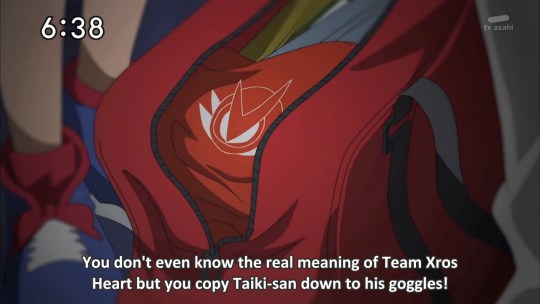
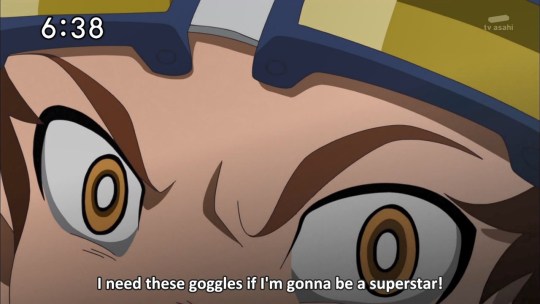
Tagiru basically sees Taiki as a “role model” -- he thinks Taiki is the model of the “superstar” level he wants to attain, and, eventually, surpass.
On the other hand, Daisuke’s circumstances and motive behind wearing the goggles were only implied in the series itself, but fully fleshed out in Spring 2003. In what’s implied to be a metaphorical conversation with his younger self, it’s said that the reason Daisuke started wearing goggles was because of “a person wearing goggles and riding something that looked like a huge dinosaur" -- Yagami Taichi, whom it seems Daisuke did not properly recognize as Taichi at the time -- during the 1999 Odaiba fog incident, when Vamdemon kidnapped everyone. Wanting “the strength to protect everyone”, Daisuke went home and picked up a pair of goggles, and has this to say about them:
...when I wear them, I guess it’s like, my feelings become stronger... ...Because I have these goggles. Even I didn’t know a lot from the start — well, I probably still don’t even now — but when I wear these, I kinda feel motivated… to do anything!
In other words, it’s likely Daisuke didn’t even realize “Taichi-senpai” was the person he was modeling himself after at the beginning -- it’s a bit unclear due to the circumstances of Spring 2003 being somewhat metaphorical, but either way it seems it had more to do with Taichi as “the hero who protected everyone” rather than simply his amazing soccer senior. Supporting this is Daisuke’s cameo appearance in the Adventure novels, which also has him express frustration at being powerless to protect his family.
(But of course, at whatever point Daisuke realized they were the same person, Taichi’s amazing soccer skills and leadership abilities must have certainly helped how much Daisuke adores him.)
Their general demeanor
Both Daisuke and Tagiru, on the surface, seem to track with the sort of “brash shounen hero” stereotype, but even their way of going about things differs greatly!

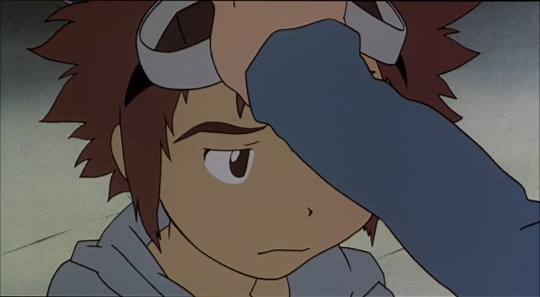
Despite Daisuke having a very “abrasive” surface demeanor -- he tends to get easily irritated at other people, and can sometimes come off as being pretty aggressive -- the truth is that he actually defers to others quite easily. This is especially in the case of the seniors or Hikari, but it extends to pretty much anyone -- the moment someone else puts their foot down, criticizes him, or takes a sufficiently large stand, he has a very strong tendency to back down. The fact that he’s so wishy-washy at the beginning of the series is a huge part of his character development, especially since the end of the Kaiser arc and the second half of the series are when he starts to make a serious stand about major things he cares about -- such as stopping more casualties at Chimeramon’s hands, or reaching out to Ken -- but he does still have some degree of deference to his friends’ opinions, and of course especially his seniors. At the very least, even if he gets argumentative, he’ll actually debate it out with them and try to make his case. In other words, Daisuke spends the course of 02 learning to be assertive, but he’s actually not as aggressive as his initial demeanor suggests.
In fact, Daisuke has often been described as being a lot like a puppy, which is something I find to be rather incredibly accurate -- he gets easily riled up or defensive, but in actuality is eager to please others and is otherwise not very threatening (especially if you give him attention).

For what it’s worth, as much as Daisuke seems to often have a lot of confidence (he does the usual shounen hero schtick of gloating about taking enemies down and all that), it’s very rare he actually talks about himself or shows any moments of pride or self-esteem. Even his joking that he might make the national soccer team was that -- a joke -- that he snapped out of the moment Taichi criticized him, and the same episode has him not even entertaining the illusion that they might win against the Tamachi team -- he’s just happy to play them at all. By the time of Kizuna, he’s rather grounded and realistic about his position and abilities in terms of how to approach his career aspirations -- overall he doesn’t actually seem to have a lot of self-awareness, positive or negative, and can be quite humble when it really comes down to it.
Considering that, it makes sense that Daisuke was able to settle for such a simple career aspiration (ramen making) -- he’s not that ambitious, and he doesn’t shoot very high. He’s happy with what he’s able to do, and while he of course wants to succeed in that and do his best, he's still satisfied with not aiming all that high.

Moreover, while he of course tends to be the one who wants to charge forward, it’s quite easy to hold him back if the others advise him that it’s a bad idea (see: 02 episode 7). During times he does put his foot down because he really, really believes it’s the only thing that can be done, Daisuke is actually forgiving of those who don’t want to charge in forward as easily as he does; in both episodes where he chooses to push on forward when the others are hesitant (02 episodes 20 and 48), he holds no ill will towards the others staying behind and simply informs everyone that he’ll go in alone if he has to.

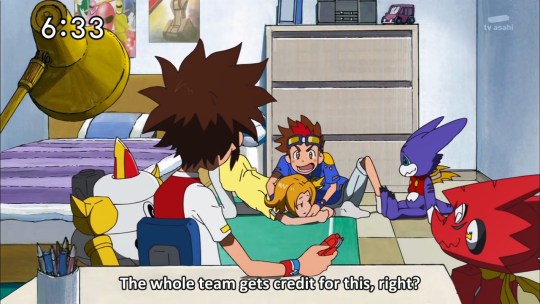
Tagiru, on the other hand, is actually as aggressive as his demeanor suggests -- he’s not nearly as deferential as Daisuke and doesn’t “deflate” as easily, is much more willing to argue with others (or disregard them and go off on his own if he sufficiently dislikes what they’re doing), and is rather generally brimming with pride and a lot of self-assuredness in being great and awesome. Unlike Daisuke, he is absolutely ambitious and wants to shoot for the highest thing he can possibly be -- hence why he wants to not just be like Taiki but surpass him, because he has the drive to push himself as far as possible.
Tagiru also has a tendency to try and “claim credit” for things (the basketball match in episode 1, the above scene in episode 14); most likely Daisuke wouldn’t even bother (except, perhaps, in the occasional moment of weakness when he’s trying to impress Hikari-chan). Moreover, Tagiru doesn’t need any permission to charge in whatsoever; he’ll do it if he wants to, regardless of what others tell him.
This also contributes to Tagiru being much less of a team player than Daisuke is -- making him excel much better in Hunters’ battle royale format in which his aggressiveness helped him compete in a game where everyone was playing for themselves. It’s likely he would have done very poorly in Daisuke’s situation, where team coordination and bonding was important to their adventure, and, conversely, Daisuke, who’s reliant on others and constantly deferential, would probably have performed very poorly in the Hunt.
V-mon and Gumdramon
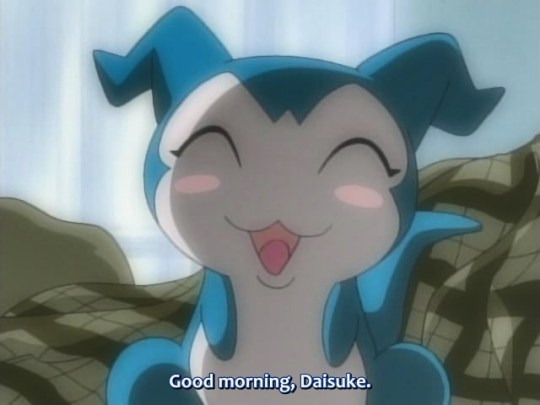

Personality-wise, I think it’s generally understood that Daisuke and Tagiru’s actual partners have rather little similarity, and everything is mainly aesthetic (being blue dragon-like Digimon) -- V-mon is rather easygoing and friendly, whereas Gumdramon’s competitiveness and mischievousness matches Tagiru’s own. In general, though, I would also point out that this is reflective of the different ways Adventure/02 and Xros Wars approached Digimon partnership as well. In Adventure/02, Digimon partners were effectively part of the inner self, so V-mon was reflective of Daisuke actually being of a quite friendly and agreeable nature when it really came down to it and you got past his abrasive surface demeanor. As a result, Daisuke and V-mon were like-minded almost unconsciously, to the point of being in sync without even trying. (Not that they’d never got into an argument ever -- see The Door to Summer -- but their relationship was definitely more of a “natural clicking” sense.)
In contrast, Xros Wars very much treats Digimon and humans as individual entities in every respect, with “partners” really just being the Digimon each General/Hunter bonded the most with and has as their core battle partner, so there is much more of a significant level of choice between partners choosing each other in terms of whether their personalities click. (The fact that Taiki and Shoutmon were very disparate in temperament and motive was a big part of the first series of Xros Wars.) Nevertheless, Gumdramon and Tagiru are extremely like-minded -- both a little mischievous, and both very ambitious. Of course, both of them being rather aggressive did lead to some friction in episodes such as 7 and 17, but this led to them ultimately bonding more deeply by working through it.
Unlike V-mon, who had no real affiliation with Agumon, and unlike Tagiru, who can hardly be said to be all that deferential to Taiki, Gumdramon does seem to be significantly deferential to Shoutmon...although mainly out of intimidation more than anything.
Round-up
So, a tl;dr in closing:
Daisuke's relationship to Taichi is almost entirely deferential, and Daisuke holds him in such high esteem that he concentrates more on Taichi being amazing more than he ever factors himself into the equation; Tagiru sees Taiki more as a role model and someone to aspire to and eventually surpass
Daisuke’s reason for taking after Taichi with the goggles is out of a desire to protect others the way Taichi did; Tagiru wears the goggles explicitly to imitate Taiki as part of his goal to be a “superstar” and eventually surpass him
Daisuke is generally deferential to others, is somewhat lacking in ambition, and only really puts a firm foot down when it’s something he cares about; Tagiru is actually capable of being aggressive, does not necessarily defer to others, and has significant ambitions of pushing himself as high as possible
Daisuke’s relationship with V-mon is that of V-mon being reflective of Daisuke’s inner friendliness, and the two simply get along naturally in a friendly manner; Tagiru and Gumdramon had to more consciously form their partnership on being more like-minded, which meant that they had to overcome some obstacles in their relationship due to both of them being more on the aggressive side.
#digimon#digimon adventure 02#digimon xros wars#digimon hunters#digimon adventure last evolution kizuna#motomiya daisuke#akashi tagiru#daisuke motomiya#tagiru akashi#shihameta
79 notes
·
View notes